Changing OurWorld
13 faculty, staff and students from Communication Sciences and Disorders travel to Belize to aid country’s children.

It’s just another way CHS is helping on a global scale.
IN THIS ISSUE:
UK SMRI researchers protect jockey livelihoods with ‘the Graham test’
Undergraduate research is setting CHS apart
We say goodbye to two legendary professors who are retiring: David Fahringer and Dr. Terry Malone
// 2023 // ISSUE 2
UK COLLEGE OF HEALTH SCIENCES
TABLE OF CONTENTS
TABLE OF Contents
DEAN’S MESSAGE
Gateway is a publication of the University of Kentucky College of Health Sciences.
Dean & Professor: Scott M. Lephart, PhD
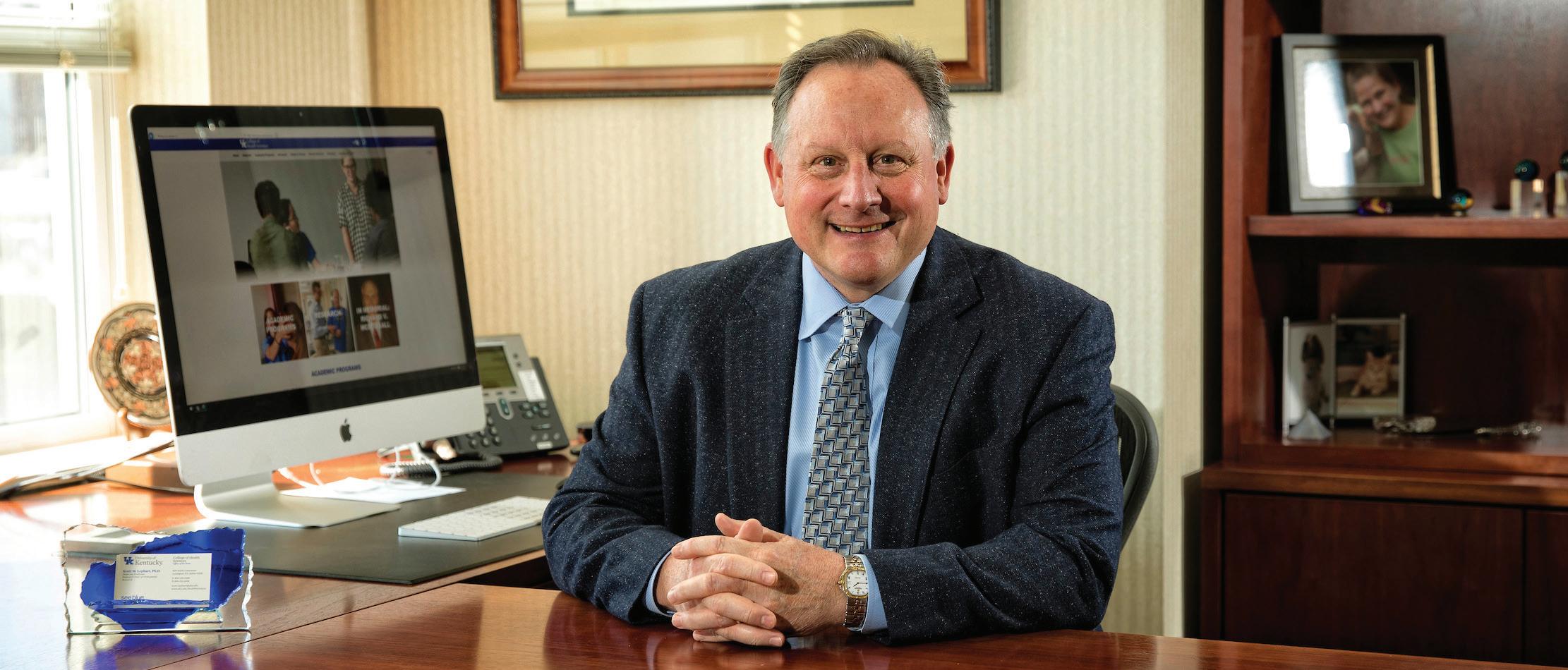
Editor: Ryan Clark
Contributing Writers: Dani Jaffe, Sara Pisoni, Lindsey Fiori and Loralyn Cecil
Graphic Design: Honey Creative
Photography: Peter Comparoni (unless otherwise noted)
Cover photo by Aimee Sayre
UK College of Health Sciences
Charles T. Wethington Jr. Building
900 South Limestone Street, Room 123 Lexington, KY 40536-0200
859.323.1100 uky.edu/chs
Copyright, University of Kentucky All rights reserved. No part of this publication may be reproduced without permission of the UK College of Health Sciences.
A MESSAGE FROM THE DEAN
BY THE NUMBERS THE LEAD-OFF
5
INNOVATION
UK SMRI researchers are protecting jockey livelihoods with ‘the Graham test’
EXPERIENTIAL LEARNING
CHS Student Leadership programs are connecting with new students
OUTREACH
CSD In Belize: 13 faculty, staff and students travel to Belize to help country’s children
DISCOVERY
One important characteristic that sets CHS apart from its competitors is Undergraduate Research — and Dr. Richard Andreatta has a passion for it
COLLABORATIVE
CHS collaborates with the School of Music for screenings as they participate in the Celebration of World Voice Day
IMPACTFUL
CHS collaborates with the School of Music for screenings as they participate in the Celebration of World Voice Day
DISTINCTION
Ashyah Mormon receives the Deborah O’Bryan Crowe Clinical Health Sciences Scholarship
OFFICE OF RESEARCH – GRANT AWARDS RECEIVED
4
3
A MESSAGE FROM 8
It sounds cliché these days, when you hear someone say they’re going to change the world. So much so, I thought about avoiding using those words altogether. And would have, if — in this case — they didn’t just happen to be the truth.
Because here in the College of Health Sciences, we are actually making that kind of change. I have example after example of how our alumni, faculty, staff and current students are changing the world on a daily basis, and you can read about some of those examples in these pages.
For instance, students in our Communication Sciences and Disorders program took a mid-semester trip to Belize to help the country’s children. The photos are amazing. And we’re saying goodbye to two retiring professors who literally traveled the world educating people about their professions.
Closer to home, CHS Student Leadership Programs are reaching out to underrepresented high school students in our community to teach them about the allied health professions.
It all comes back to our mission in this College, where we help the people of the Commonwealth of Kentucky and beyond attain the highest level of health possible. We fulfill our mission by educating the next generation of health care practitioners through education, innovative research, healing and compassionate care.
Now, this care has overlapped into CHS helping those across the globe. It fills me with a pride that is almost difficult to describe.
Once again, it is wonderful to see the stories in this magazine that showcase how hard our CHS family is working every day — working to not only make our Commonwealth a better place, but to make our world a better place, too.
Enjoy the latest issue of Gateway! And please, stay healthy and well,
Scott M. Lephart, PhD Dean and Professor
TO SHARE? Contact Gateway editor Ryan Clark with story ideas at ryan.clark@uky.edu
HEALTH SCIENCES GATEWAY 2 24 26 3 2023 ISSUE 2
THANK YOU TO OUR DONORS 12 14 18 20 22 23
THE DEAN
DO YOU THINK YOU HAVE A GOOD STORY
BY THE Numbers
Educating the workforce to address the most pressing health care issues
THIS GROWTH CREATES THE NEED FOR MORE SPACE. SAY HELLO TO THE HEALTH EDUCATION BUILDING, SCHEDULED TO BREAK GROUND IN 2024.
4 COLLEGES
Health Sciences, Medicine, Nursing and Public Health
Former CHS Dean Named Ohio U. President
Former College of Health Sciences’ Dean, Dr. Lori Stewart Gonzalez, became Ohio University’s 23rd President on July 1, 2023.
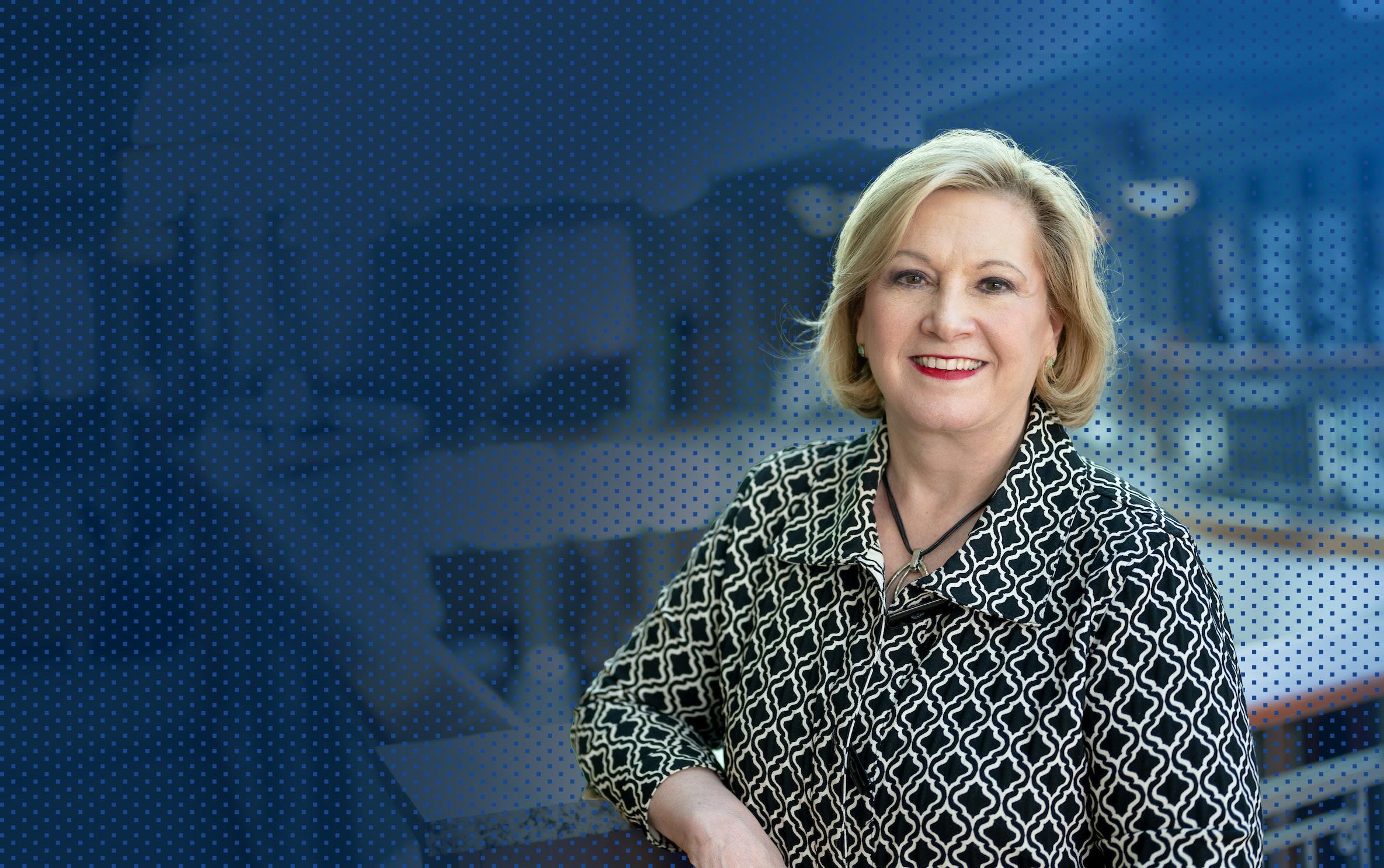
“I see public education as the ultimate opportunity to give back, and I’m so honored to partner with the Ohio University community to give back to a region that I call home,” Gonzalez told Ohio University’s public relations staff.
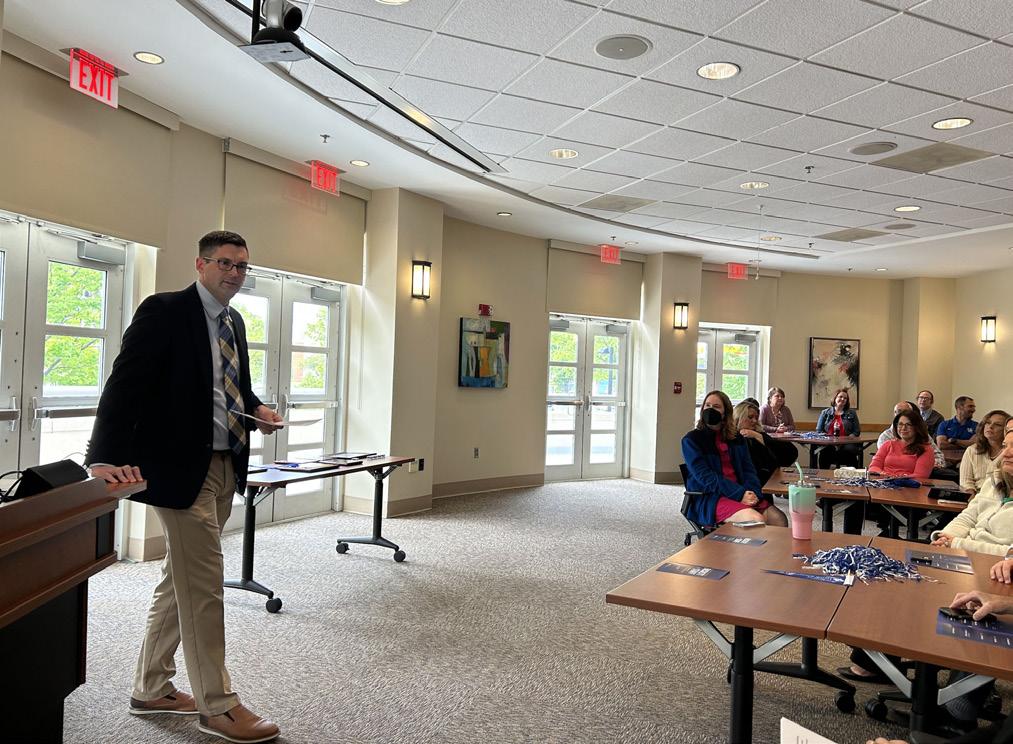
IN THE COLLEGE OF HEALTH SCIENCES, THERE IS UNPRECEDENTED GROWTH.
71% enrollment growth for undergraduate students since 2016
CHS Honors Faculty and Staff
HONOREES INCLUDED:
• Excellence in Faculty Scholarship Award for Early Stage Scholar: Leslie Woltenberg, PhD
45% faculty growth since 2016
450,000 gross square feet
ONE
60% of the new Health Education Building is dedicated to the Learner Experience simulation center, standardized patient center and experiential learning center
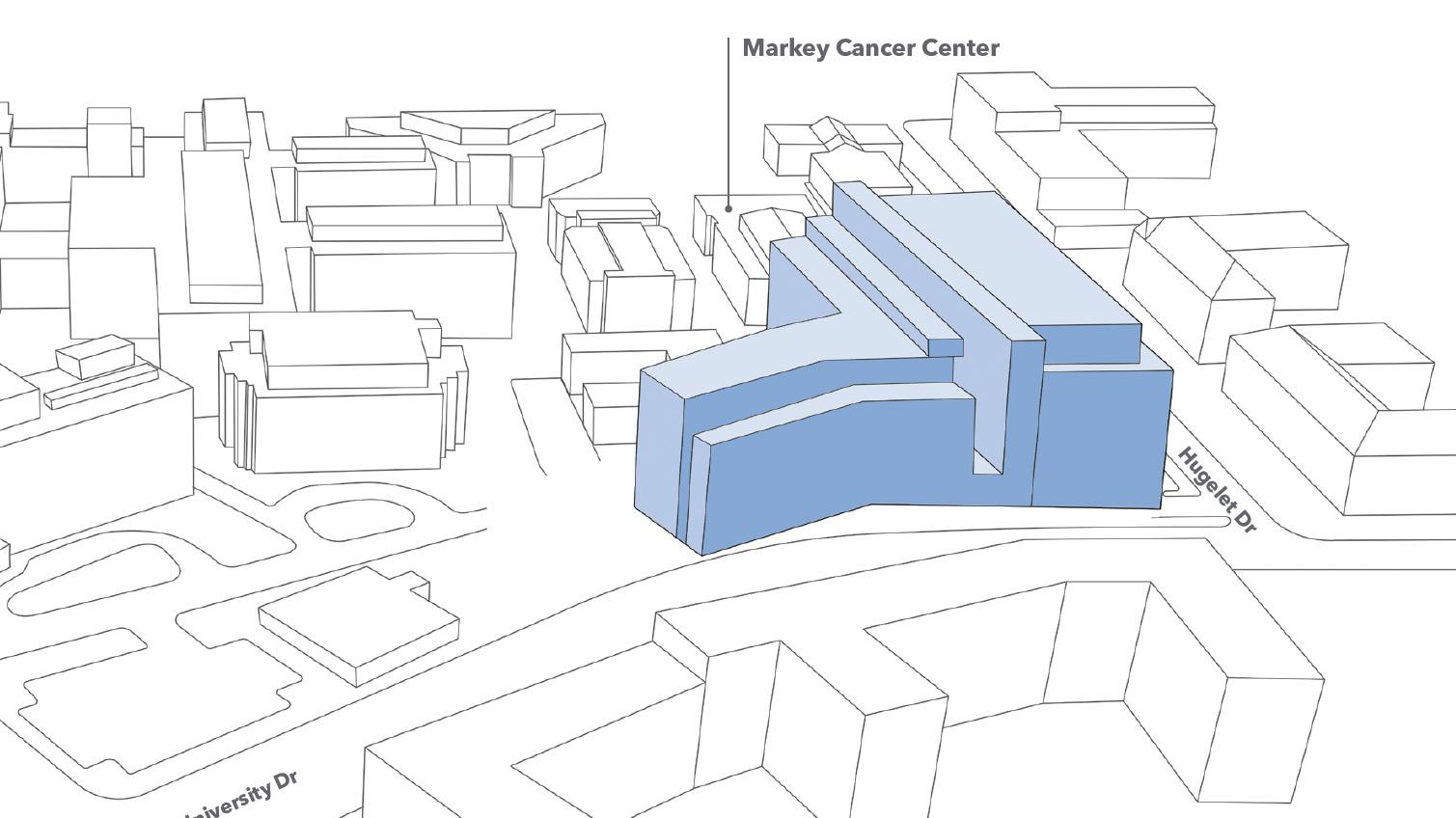
67% staff growth since 2016
It was a celebratory kind of day as the College of Health Sciences honored its own faculty and staff in April.
• Excellence in Faculty Scholarship Award for Senior Scholar: Richard Andreatta, PhD, ASHA Fellow
• Excellence in Research - Early Stage Investigator Award: Kirby Mayer, DPT, PhD
• Excellence in Research - Senior Investigator Award: Matt Hoch, PhD, ATC
• Richard D. Kingston Award for Excellence in Teaching: Leslie Woltenberg, PhD
• Staff Excellence Award (Non-Exempt): Kim Rice (and honorable mention: Nancy Seligman)
• Staff Excellence Award (Exempt): Will Hieronymus
• Student Impact Award: Angie Phipps
HEALTH SCIENCES GATEWAY 4 5 2023 ISSUE 2
Gonzalez served as CHS Dean from 2005-2011.
BY THE NUMBERS
PHOTO BY BEN WIRTZ SIEGEL
THE LEAD-OFF
COLLETT BEGINS SECOND TERM ON SENATE COUNCIL
Last month, DeShana Collett, PhD, PA-C, began her second term as UK’s Chair of the Senate Council.
As the first person of color to serve in the role, the Lexington native takes it seriously.
The overarching governance body for the University, the Senate is made up of faculty senators, student senators and Deans — about 120 people in all. “Our constituents trust us to speak on their behalf,” she says. Congratulations to Dr. Collett.
HOCHS HONORED
Matthew Hoch, PhD, ATC, has been named a 2023-24 University Research Professor, the College of Health Sciences announced in March. The University Research Professorships were established by the UK Board of Trustees in 1976 to recognize outstanding research achievements. Later in the semester, Hannah Hoch, PhD, ATC, was honored with the KATS 2022-2023 Educator/ Preceptor of the year. Hoch, the Associate Professor in the Department of Athletic Training and Clinical Nutrition, and Program Director of the Professional Masters in Athletic Training, said winning the award was an “absolute honor.” This was after she was also inducted into the AT Academy in National Academies in Practice.
GOSNEY IS MEMBER OF BOARD OF TRUSTEES
Brenda Baker Gosney, PT Class of 1970, who was on the faculty at UK in the College of Health Sciences Physical Therapy Program early in her career, is a member of the UK Board of Trustees. Her term of service began in July 2022 and extends through June 2028. The Board of Trustees is the final authority in all matters affecting the institution and exercises jurisdiction over the institution’s financial, educational, and other policies and its relation with state and federal governments.
Gosney spent her professional career in healthcare and retired as chief executive officer of HealthSouth Northern Kentucky Rehabilitation Hospital (now Encompass Health). She also holds a Master of Science in Education degree in higher and adult education from the UK.
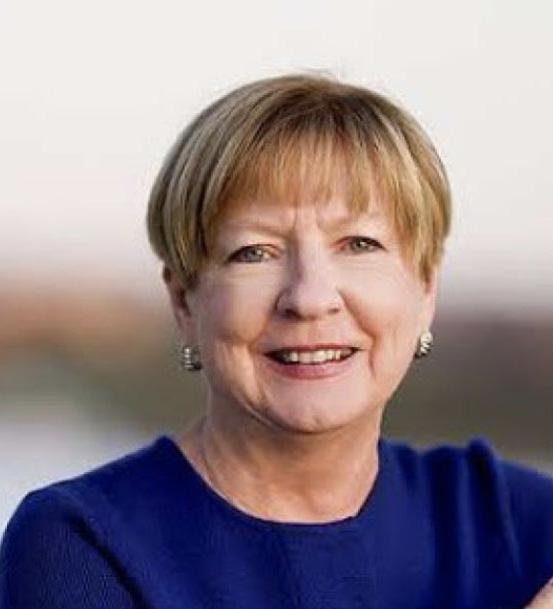
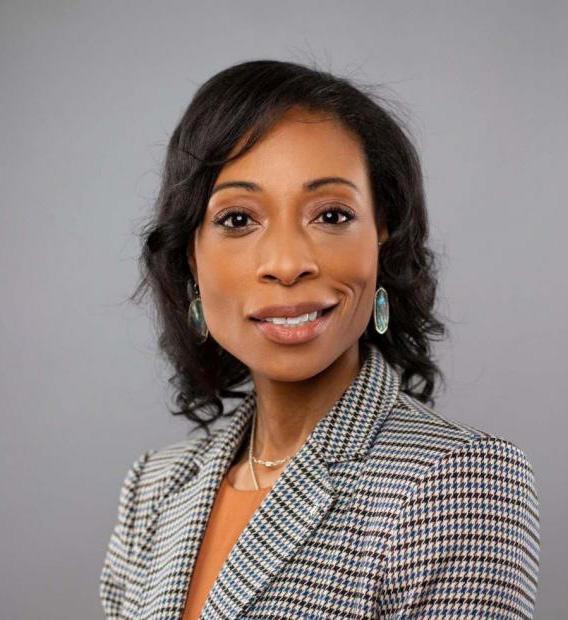
Active in professional organizations, Gosney was a member of the American Physical Therapy Association (APTA) and the Kentucky Physical Therapy Association (KPTA) and held the offices of president of KPTA and chief delegate to APTA. She has been on the board of directors of the UK Alumni Association for 18 years and served as president for the 2013-2014 term. In the business community, she served on the board of directors of the Northern Kentucky Chamber of Commerce and was a member of the executive committee as secretary and as chair of the inaugural Health Initiatives Committee.
UHL RECEIVES AASPT’S HALL OF FAME/LIFETIME ACHIEVEMENT AWARD
This spring, the American Academy of Sports Physical Therapy Executive Committee, as well as the Hall of Fame Committee, honored Tim Uhl, PhD, PT, ATC, FNATA, with the Turner A. Blackburn Hall of Fame/Lifetime Achievement Award. The award is one of the highest and most prestigious of the Academy, dedicated to honoring members who have “made a lasting contribution to the specialty of sports physical therapy over their career,” the website says.
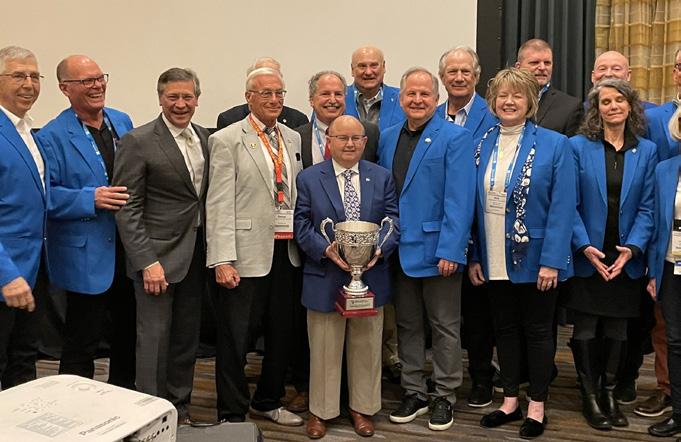
SKAFF SELECTED AS INAUGURAL MEMBER OF ADHA PROFESSIONAL FELLOWS PROGRAM
Karen Skaff, RDH, PhD, has been selected as an inaugural member of the ADHA Professional Fellows Program. The inaugural class of Professional Fellows were recognized at the ADHA2023 Annual Conference in Chicago during the opening ceremonies in July.
CONGRATULATIONS TO THESE NEW HIRES OVER THE PAST ACADEMIC YEAR:
Hannah Anderson, Jaime Cress, Miriam Gillies, Susan Herrick, Tereza Janatova, Ryan McGuire, Ke’la Porter, Hannah Jaggers, Emily Sagstetter, Alex Schroeder, Paige Sherman, Ashley Sparks, Jada Sturgis, Wafa Suleiman, Amy Wendel
TOYOTA DONATES $125K TO APPALACHIAN CENTER FOR ASSISTIVE TECHNOLOGY
In March, The University of Kentucky announced a $125,000 grant from Toyota Motor Manufacturing Kentucky to support the new Appalachian Center for Assistive Technology, or ACAT, located in Hazard. Patrick Kitzman, PhD, PT and professor in the College of Health Sciences’ Physical Therapy and Rehabilitation and Health Sciences PhD programs, is director of both the Kentucky Appalachian Rural Rehabilitation Network and ACAT. The new center had its grand opening April 10.
CHS COLLABORATES WITH MEDICINE TO UNVEIL ONLINE CLINICAL NUTRITION MASTER’S DEGREE
The University of Kentucky announced in May the official creation of a fully online, interdisciplinary Clinical Nutrition master’s degree. Housed within both the Colleges of Medicine and Health Sciences, the Master of Science in Nutritional Sciences will take only 18 months to complete, while preparing students for careers in health care, academia, education, wellness and other nutrition-related fields.
FIRST COHORT OF UK HEALTHCARE ONLINE STUDENTS GRADUATE
The first cohort of UK Healthcare online Clinical Leadership and Management students graduated this spring. In 2019, representatives from UK HealthCare were exploring educational opportunities available at UK for their employees. Clinical Leadership and Management emerged as a beneficial option—especially when the program added a part-time, online course sequence.
CHS INTRODUCES THE WAY PODCAST
In February, former Gateway cover subject April Ballentine’s story became episode No. 1 of The Way Podcast, which launched on podcast platforms everywhere. Listeners can expect a new episode every month, with the majority running about 30-40 minutes.
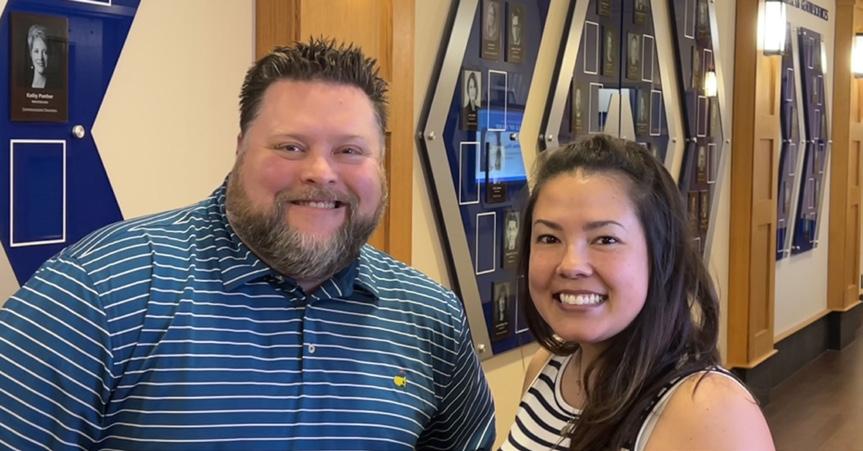
“We want to go deeper than we can with just a web story,” said co-host Ryan Clark, director of communications for the College. “And we want to hear the story in the subject’s own words.” Bernadette Cortez, director of recruitment, serves as co-host.
PAS RANKED NO. 20 IN NATION
U.S. News & World Report ranked the University of Kentucky’s Physician Assistant Studies among the best programs in the nation. U.S. News surveyed 211 physician assistant peer programs, accredited by the Accreditation Review Commission on Education for the Physician Assistant, who responded on a 1-5 scale (1, or marginal; to 5, outstanding) of academic quality. Rankings were determined by the average of the ratings each program received.
7 HEALTH SCIENCES GATEWAY 2023 ISSUE 2 6 THE LEAD-OFF
The Odds IMPROVING
While horse races are an exciting time for many, onlookers in Kentucky and around the world don’t often consider how much risk jockeys face in their profession every day, all year around.
Jockeys, who weigh around 110 pounds and stand anywhere between 4 feet, 10 inches and 5 feet, 9 inches, can be thrown from their horse in an instant — especially as they perch on their toes over their horse at speeds up to 40 miles per hour.
“I don’t know if there are any jockeys who haven’t ridden with a cracked or broken bone in their body before,” said wellseasoned Irish jockey James Graham. “I know we all have. We have a ton of physical injuries, from back, face, arms, hands, knees, ankles — you name it. And we want to ride. We’re resilient. So, many of us just push through.”
BY DANI JAFFE CHS Contributor
The most severe injuries that jockeys face are head injuries. In fact, horse racing is the most dangerous sport for concussions, even surpassing American football. Yet, horse racing is behind many other professional sports in terms of caring for and protecting against injuries like concussions.
“I’ve had my head rattled around quite a bit the last few years I’ve been racing,” said English jockey Jack Gilligan. “And a lot of my injuries went undiagnosed, probably just due to not being educated about them. Us jockeys don’t like to admit we’re injured so we can keep riding, and that sometimes forces us out of the saddle for extended periods of time when those injuries accumulate.”
Jockeys ride 12 months out of the year, and these “forced vacations” present a number of physical, emotional and financial challenges.
“We lose a lot of business if we’re forced to be out of work for 12-18 months, which isn’t ideal for most of us who have families,” said Peruvian jockey Rafael Bejarano. “Every day in this career is a competition.”
If not properly assessed and cared for, repeat concussions can be detrimental to the career and life of any athlete. Therefore, it is absolutely crucial for athletes of all kinds — including jockeys — to have access to adequate athletic training and sports medicine care. Researchers at the University of Kentucky Sports Medicine Research Institute (SMRI) recognize this need, especially in the local horse racing community, and are actively working toward developing research to inform and support policy.
“Unfortunately, the horse racing world has fallen behind in terms of creating and enforcing policy that protects the health of jockeys,” said Michaela Keener, research administrative coordinator with the Equestrian Athlete Initiative through the SMRI. “The Horseracing Integrity and Safety Act just went into effect on July 1 of this year — and part of that includes a basic requirement for jockeys to receive yearly concussion tests and tests as-needed so that they are able to return to riding safely. This is already an enforced practice in other sports, so it has been a critical need in this community prior to this act.”
Thankfully the horse racing world is now enforcing these tests — but the next challenge is to ensure that the established tests are actually working for this unique demographic.
In most sports, athletic trainers assess concussions by using the Balance Error Scoring System (BESS) test, which measures the postural stability of an athlete after a mild brain injury, like a concussion. The test consists of asking the athlete to stand in three positions: with their feet together, with their feet tandem and then on one foot. These three positions are performed on a stable surface, like the ground, and then an unstable surface, like a foam pad, with their eyes closed.
The BESS test is a common protocol used in most athletics because it’s quick and easy to conduct on the sidelines. But for many jockeys, who spend so much time crouching and straddling a horse, these positions feel unnatural, and they can struggle to maintain balance while perfectly healthy.
“So, we thought, if a jockey is doing poorly on the BESS prior to a concussion, how is it going to accurately diagnose a concussion when they fall or get hit by a horse in the gates?” Keener said.
Essentially, the BESS test and other existing concussion protocols aren’t a one-size-fits-all, and the majority of concussions in the jockey community go undiagnosed.
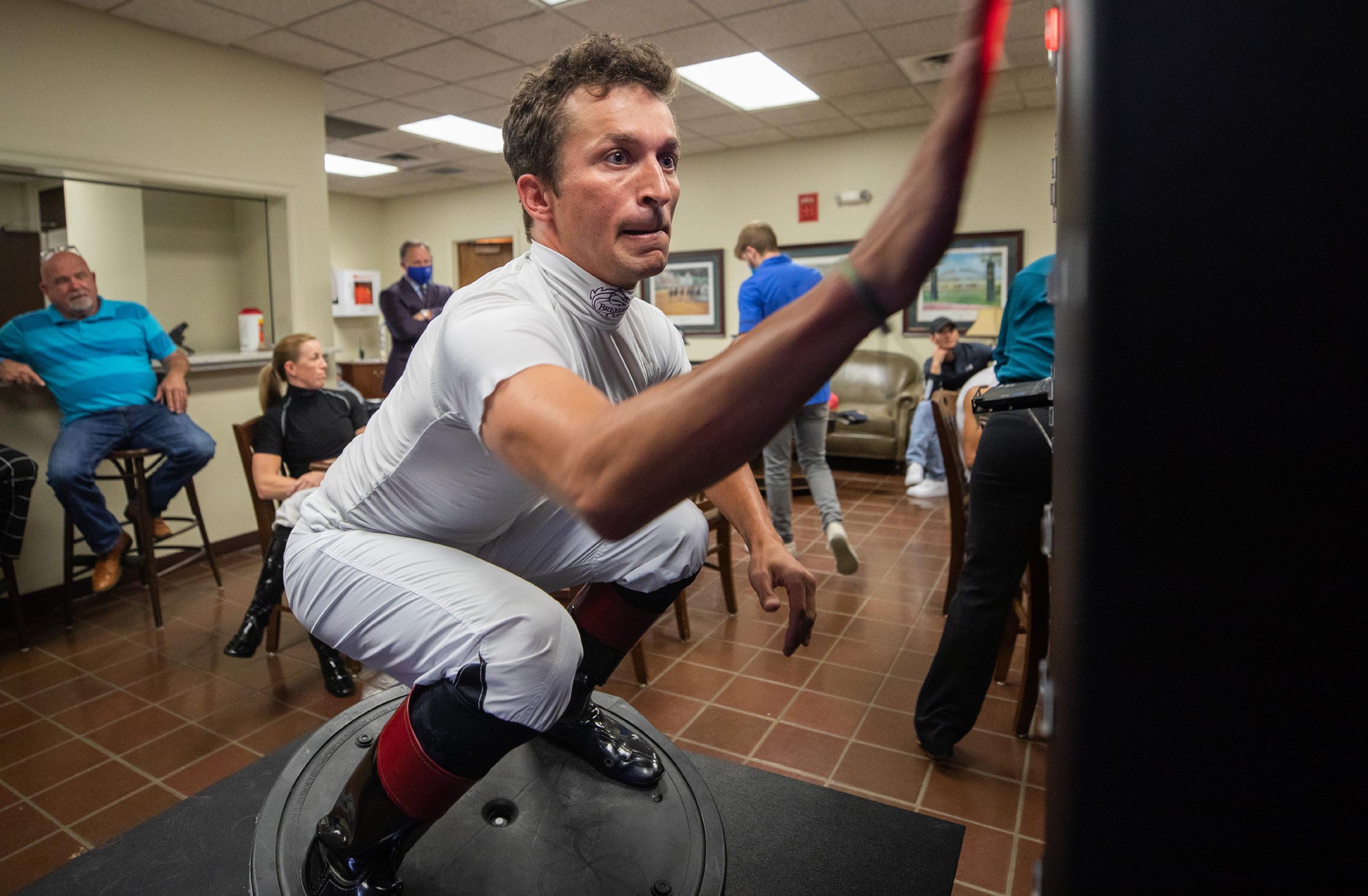
Keener, who is also a rehabilitation and health sciences doctoral student in the College of Health Sciences, and Kimberly Tumlin, Ph.D., assistant professor in the College of Public Health and research director of the Equestrian Athlete Initiative, have been around horses all their lives. Keener and Tumlin, who were both brought to Kentucky because of their love of horses and research, have developed a groundbreaking jockeyspecific concussion test to close the gap and fulfill some of these needs in the jockey community.
They call it “the Graham Test,” affectionately named after aforementioned jockey James Graham. The test involves asking the jockeys to perform a reaction-time test while balancing on an upside-down BOSU ball and then again on a stable surface, both while in their riding position.
“We named the test after James because he has been a huge help in developing this with us,” Tumlin said. “We can always count on him to be upfront and honest with us about what is working and what isn’t — so this test really is named in honor of James’ contribution to our protocol. We truly couldn’t have developed this without him.”
The two researchers have been working day-in and day-out with Graham, Gilligan and other jockeys here in Lexington,
HEALTH SCIENCES GATEWAY 8 9 2023 ISSUE 2 INNOVATION
In a sport of the highest stakes, UK SMRI researchers are protecting jockey livelihoods with ‘the Graham test’
PHOTOS BY ARDEN BARNES/UK PHOTO
Above: Jockey Rafael Bejarano balances in riding position on an upside-down BOSU ball while SMRI researchers test his reaction time to a series of lights.
“Every day in this career
is
a competition.”
collecting data and asking them for their feedback during the past five meets at Keeneland.
“Back in 2020, Keeneland welcomed us to come work at the meet, which is when we began collecting data,” Keener said. “We asked jockeys to squat in their position and hold it for two minutes while balancing on a BOSU ball pre- and post-race day to see how their balance and position changes across the workday. Then, a year later, we added the reaction time component, which was suggested by the jockeys to simulate how they have to make quick decisions during a race.”
In the SMRI, researchers use a large reaction time testing machine called the Dynavision for various sports research. The Dynavision is an interactive light board used by athletes worldwide to assess performance factors such as awareness, balance and motor skills — which can also serve as a test for concussions. However, when Keener and Tumlin wanted to add the reaction-time component to their test and took the machine out to the track, they realized that this piece of equipment, while helpful for many other athletes, isn’t suitable for jockeys.
“We found that the Dynavision just isn’t applicable out in the field,” Tumlin said. “First, our jockey population travels a lot, and we can’t move this big machine track to track. And the machine is designed for users to look up, which isn’t natural for jockeys while in their racing position. So, we worked closely with the jockeys who gave us
some valuable feedback on what else is working for them and what isn’t, in terms of actually using the device.”
Keener and Tumlin found that they needed to create a new setup all together to fit the jockeys’ needs. And they wanted to do it in a way that included the jockey community in the conversation. That’s what brought them to creating this unique set-up for the Graham Test.
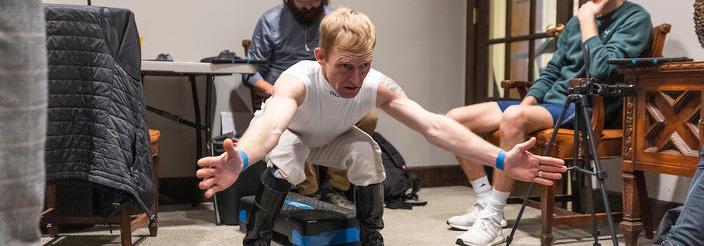
“We got a lot of great feedback from the jockeys when using the Dynavision,” Keener said. “When we asked them to use it while in their riding position balancing on the BOSU ball, we were able to see which lights they didn’t need, and where to place lights to be relevant to their occupational demands.”
They found that the Graham Test is able to assess the jockeys accurately and in a way that takes advantage of their specific physical strengths.
“We actually found that the jockeys, when in their racing position on the BOSU ball, have a faster reaction time,” Keener said. “Their accuracy goes down a small amount, but this truly shows us that their riding position is where they are most comfortable,
and where we should be assessing them for head injuries.”
In spring of 2022, Keener and Tumlin brought the first model of the Graham Test to Keeneland. After working closely with the jockeys to refine it, they’ve now created a more definitive version of the device which they collected data on during this year’s fall meet.
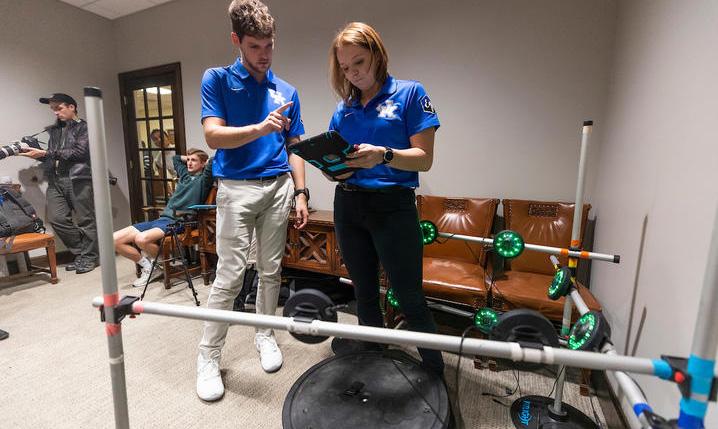
“We are truly at the forefront of developing an affordable, portable and engaging test where the jockeys actually want to come and test with us,” Keener said. “Because underreporting is a huge issue in many sports — not just horse racing.”
For jockeys, a lot is at stake if they’re unable to ride.
“Unlike the NFL, or other professional sports, jockeys aren’t on a salary — they work for themselves, and they don’t get paid if they don’t ride,” Keener said. “So, we want to protect their health, yes, but also get them back to riding as safely and quickly as we can. And, hopefully, we will be able to set an example and the Graham Test could become the popular protocol for testing concussions in this industry that will let them do so.”
Tumlin says, without Keener, none of this would have been possible.
“The development of this groundbreaking test was really with the help of Michaela’s efforts, and her background in biomechanics,” Tumlin said. “She is so passionate about what she does, working with her is incredible. As are our undergraduate student researchers. We have had so many great helpers who have helped develop this test and collect data with us; many of us come from very different research backgrounds which makes us a great, cohesive team.”
One undergraduate research assistant, Gavin Vice, a student in College of Engineering, has been a huge part of the process in developing the Graham Test and assisting in data collection.
“One of the coolest things about the Graham Test is that it really will quantify a jockey’s reaction time and balance,” Vice said. “With the BESS test, it is completely subjective — a human is telling you whether you are performing at the standard. With the Graham Test, you must break the barrier or hit the lights a certain number of times in order to pass and maintain your balance, and the technology will tell you whether or not you’re passing. So, it’s more standardized and specific — hopefully allowing for more precise and accurate concussion diagnoses.”
Graham says the new test is much better and more comfortable than other standard concussion tests he has tried during his 30-year horse racing career.
“This test is going to be able to tell us when something is wrong, and it’s going to stop us from heading out and potentially making that injury worse,” Graham said. “It will ultimately help us prolong our careers, which is huge. Bottom line is, I love this test. And am so grateful that Kim and Michaela come out here each meet to help us jockeys.”
and further develop this research, and so thankful for Keeneland’s eagerness to invite us back each meet — this allows us to continue doing what we love and to continue helping the jockey community.”
Inspiring jockeys to become advocates for their health has been one of the most rewarding parts of this project for Tumlin, who is looking at this from a public health background.
“Because the horse racing world has been behind other sports in enforcing adequate jockey safety protocols, many jockeys weren’t able to advocate for their own health,” Tumlin said. “So, I’m able to help them advocate for their own health and safety, which they completely deserve as much as other athletes do. And so, if I’m able to do this, I know I’m doing a good job in my research.”
One of the key factors in developing this research is the symbiotic relationship that the University of Kentucky and Keeneland have created.
“Our extended partnership with Keeneland has been vital to promoting rider safety,” Tumlin said. “We are very lucky to get to come back each meet
Keener said that conducting this kind of research for a living has been a dream come true, but it’s become about more than just research. They have developed a unique relationship which will support their work for years to come.
“The jockeys have really welcomed us into their family,” Keener said. “What we do at the meet twice a year is exhausting, but every time Keeneland asks us to come back for the next meet, all of us get so excited to reunite and see each other again, catch up and continue working toward our goals together.”
Graham hopes that his namesake will continue to help jockeys for generations to come.
“The work they are doing here is incredibly important,” Graham said. “I’ve seen so many injuries during my career — some of us are literally pieced together after all our injuries. But this is one huge step in the right direction to ensuring my community is safer and healthier than ever, and I’m so grateful to see it come to fruition for the sake of jockeys here in Kentucky and beyond.”
11 2023 ISSUE 2 HEALTH SCIENCES GATEWAY 10
“We are truly at the forefront of developing an affordable, portable and engaging test...” Keener said.
BUILDING BRIDGES & MAKING MENTORS
CHS Student Leadership Programs are connecting with new students
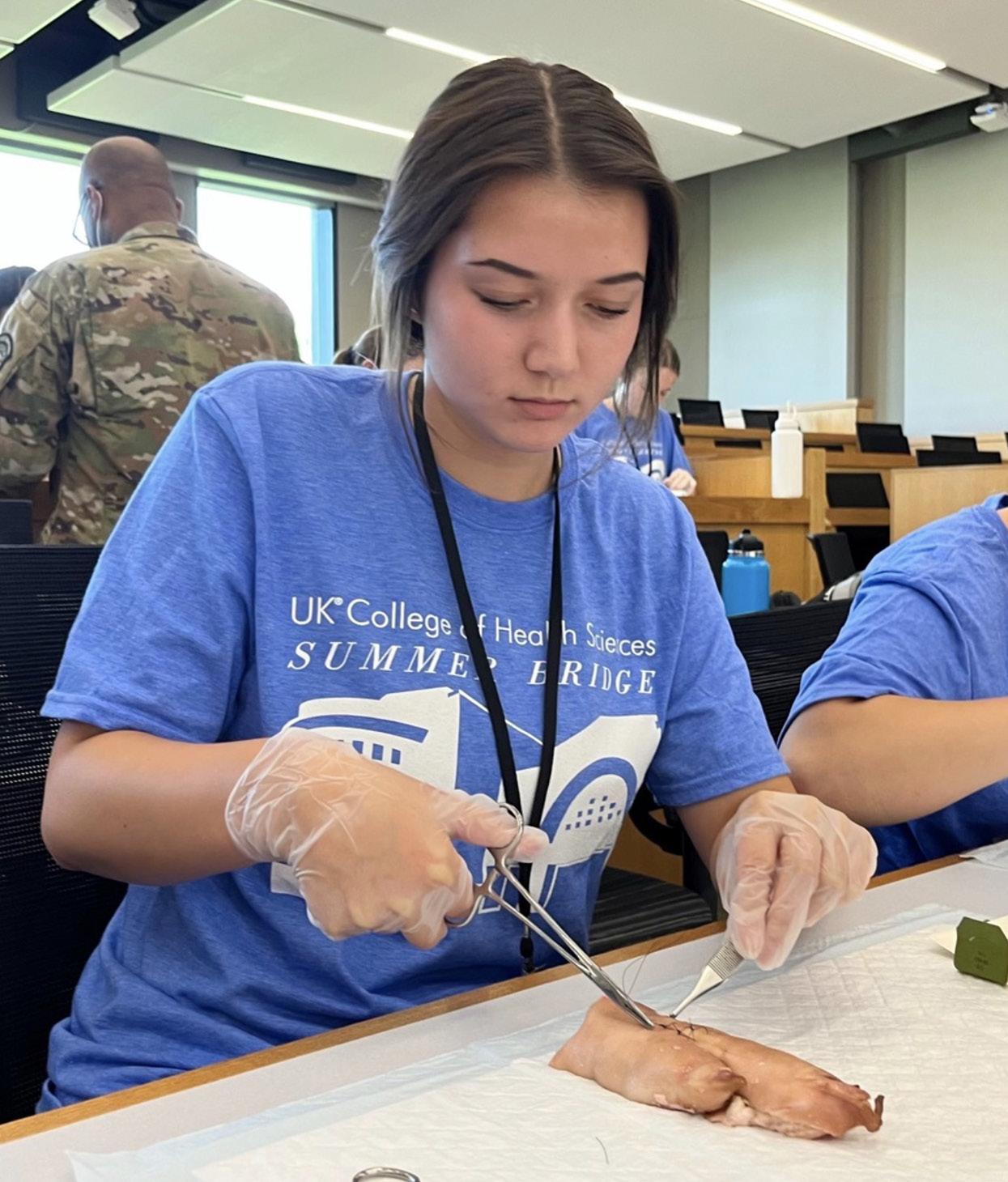
Emma Pastirik never knew just how much she would get out of helping others — or, how the connections she formed with high school students would lead to a change in her career goals, and ultimately, to the success of the Diversity Healthcare Program.
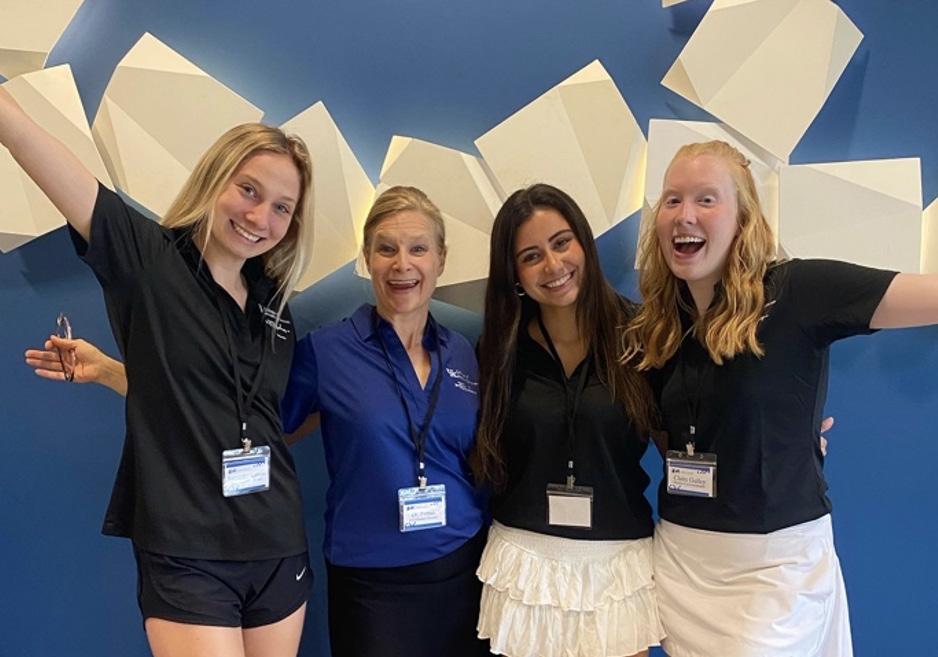
COLLEGE OF HEALTH SCIENCES’ AMBASSADOR PROGRAM
You see, Emma is about to begin her senior year as a Human Health Sciences major. She’s been an ambassador for the College of Health Sciences’ Ambassador Program since her freshman year and now she serves as the Executive Chair. Over time, she developed a love for working with adolescents, and she hopes to continue that work someday as a Physician Assistant.
But she never thought she’d be heading down that road.
“When the Diversity Healthcare Program first started, I didn’t know what to expect, but I think it’s meant more to me than I ever knew,” Emma said. “Getting to go to the high school and work with the students, we get to have a direct impact. It’s been eye-opening for me, because I never saw myself working with kids like this. It requires a lot of patience, and I’ve been working on that. But the point is, not only do I get to help them — they’re helping me.”
PATHFINDER PEER MENTORS
The College of Health Sciences’ Ambassador Program, as well as another group called the PATHfinder Peer Mentors,
BY RYAN CLARK AND LINDSEY FIORI CHS Contributors
work to create a diverse and inclusive environment for pre-professional healthcare students on campus and in the greater Lexington community. The Ambassador Program focuses on educating and mentoring local high school students through the Diversity Healthcare Program, while the PATHfinder Program provides a community of mentors to first-year students in the College of Health Sciences to help assist students as they transition to college.
DIVERSITY HEALTHCARE PROGRAM
In the midst of the pandemic, the CHS Ambassadors began to develop the Diversity Healthcare Program, with the goal to diversify the healthcare profession by partnering with minority and underrepresented high school students in Lexington. The Ambassadors work to empower these students by providing mentorship through college and career exploration. The Diversity Healthcare Program is open to freshmen at Bryan Station High School interested in exploring the healthcare field. The CHS Ambassador Program focuses on three components throughout the students’ high school careers: big/little mentoring, college exploration and health career exploration. The Big/Little Mentorship Program begins in their sophomore year, where high school students are paired with an undergraduate student and a professional student who share a similar career interest. College Exploration also begins during the sophomore year, as students learn about college credit courses, preparing for standardized exams and the college application and financial aid process.
“I can see now, that once we’ve worked with the students
on the high school level, we can educate them about certain things, and they become interested in what we’re doing,” Emma said. “I think I can do the same thing as a provider, and potentially teach them to be healthier adults and get them interested in health care.”
Additionally, the students at Bryan Station begin to participate in service opportunities such as mentoring middle school students and working with FoodChain, a local nonprofit, to address problems like local food insecurity crises. The Diversity Healthcare Program has partnered with colleges at UK such as the College of Dentistry, College of Medicine, College of Nursing, College of Pharmacy, College of Public Health, and UK HealthCare. Students get to hear presentations from the various partners, and in addition, participate in interprofessional case studies.
SUMMER BRIDGE PROGRAM
As first-year students enroll into the College of Health Sciences, they continue to have mentorship opportunities with the PATHfinder Program, which features compassionate mentors from CHS who provide an empathetic ear and a friendly face. In 2020, these peer mentors developed the Summer Bridge Program, a four-day program for first-year students designed to enhance their personal and academic transition into college. Throughout the four days, students get to meet their future classmates, peer mentors and faculty while being introduced to the College of Health Sciences. Additionally, the mentees get to
participate in hands-on activities and receive information on financial resources, career exploration and research. Last semester, the PATHfinders Program received a grant from Women and Philanthropy to fund the program through 2023. During the fall semester, the PATHfinders continue to assist students in entry-level CHS courses. This allows students to ask questions and work with their mentor each week. In the Spring, the PATHfinders assist the Office of Student Affairs with Merit Weekend and Summer Advising for incoming students.
“Going into Summer Bridge 2022, I was very nervous because I had never been five hours away from home, let alone on a college campus,” said Alexis Herbeck, a sophomore Medical Laboratory Science major from Millstadt, Ill. “That nervous feeling went away the second I got there and met all of the Peer Mentors. They were so welcoming and energetic, just like me, and I felt that this was right where I needed to be.”
Alexis is now a PATHfinder Peer Mentor for the upcoming school year and is excited to provide first-year students with the same warm welcome she received.
“As summer bridge continued, I formed a bond with the Peer Mentors,” she said. “The bonds I made with the Peer Mentors were the most special, because even after Summer Bridge they stayed in contact with me and wanted to see me succeed. That is why I want to be
Peer Mentor. I want freshmen to feel like they have a safe space and feel prepared for their first year at UK just like my Peer Mentors did for me.”
HEALTH CARE OPPORTUNITIES
Layne Singer, a senior Human Health Sciences major (on the pre-med track) from Los Angeles, Calif., was originally given a tour by a CHS Ambassador, and he immediately wanted to do the same thing. He said that helping to create, and then participate, in the Diversity Healthcare Program, was one of the most significant accomplishments of his college career.
“We want to promote these programs so these students can find out more about our health care options,” he said. “These programs work, even though there are so many moving parts, they are working. And it just makes you feel good when you see that you’ve made a difference.”
13 HEALTH SCIENCES GATEWAY 2023 ISSUE 2 12
EXPERIENTIAL LEARNING
PHOTOS COURTESY OF: RANDA REMER, PHD
CSD IN Belize
13 Communication Sciences and Disorders faculty, staff and students travel to Belize to help country’s children
BY RYAN CLARK CHS Communications Director
Sayre
For many in the College of Health Sciences, breaks in the academic calendar — be they Spring, Winter, Fall or other holidays — seem to be utilized to help others, whenever possible.
Another example of this was found just before last semester, when 13 faculty, staff and students from the Communication Science and Disorders department traveled to Belize for just over a week to help the country’s children.
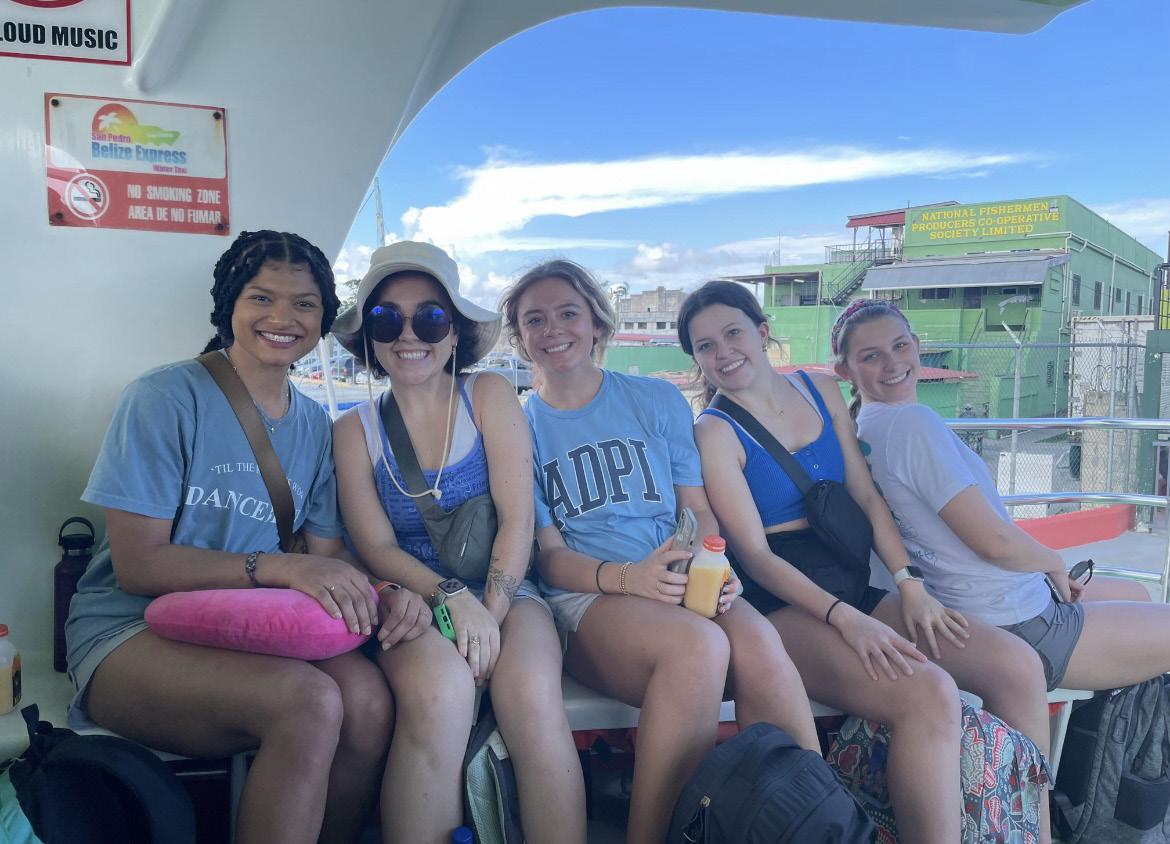
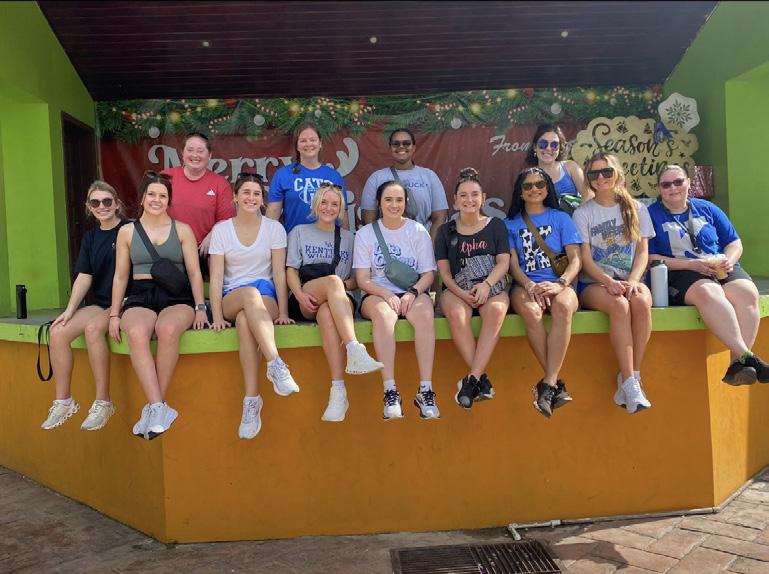
It all began before the COVID pandemic, when UK’s Study Abroad Office made a concerted effort to reach out to programs to make sure they had opportunities to study abroad.
“I started looking online at different programs that were available for students studying to be speechlanguage pathologists,” said Aimee Sayre, M.A., CCCSLP and Academic Clinic Director for the department of Communication Science and Disorders. “I found a company called Therapy Abroad, that offered a number
of opportunities throughout the world to gain real-world experience in the field of speech-language pathology.”
It led them to Belize, a country on the northeastern coast of Central America. Sayre and others started planning the trip in 2020, but once the world changed, everything was delayed due to the pandemic. But it did give the students time to fund raise and apply for scholarships to help fund the trip, which is paid for by course fees. Finally, at the beginning of 2023, they were able to go.
Sayre said the educational opportunity for students was two-fold.
“Having the opportunity to gain hands-on experience and practice clinical skills while learning about different cultures was invaluable,” she said. “We were able to attain a greater understanding of speech language pathology services in developing countries and different social issues.”
And they were definitely in need, as Belize has just one speech therapist in the entire country.
“There are really limited resources there,” Sayre said. “Anything we could do to help was very much appreciated.”
For three days, the students held a camp to help special needs children — who were aged 2-11 — with speech therapy. And they were also able to help educate parents on how to continue the therapy.
“It was really eye-opening,” said Mary Beth Allen, MS, CCC-SLP, and Telehealth Support Services Director in Communication Sciences and Disorders. “You learn to just do the best you can with what you have in a limited amount of time. But it’s true you can make an impact.”
She said they could all feel the parents’ gratitude. One child had not had a bath in weeks because it was so challenging. After getting some strategies from the students, the parents later reported that the boy took a bath — and it was the easiest time they’d had in a long while.
“They knew we were trying our best to help their children,” Allen said. “They seemed to really trust what we had in place.”
Lynsey McAllister is a third-year student pursuing an undergraduate degree in Communication Sciences and Disorders and plans to graduate in December 2023. She said she realized how lucky she is to be in a place where speech and language services are readily available.
“I know our presence meant so much to the families we worked with while abroad,” she said. “This trip served as a confirmation that I am right where I am supposed to be, and couldn’t be more excited for my future as a licensed speech-language pathologist. I am so proud of myself for getting out of my comfort zone and truly immersing myself in the experience.”
Sayre said she is now planning future trips, — for instance, they will return to Belize for Spring Break 2024. But other trips could feature different locales and opportunities.
“This trip could not have gone better for the first time — in the future, it may look a bit different, but the plan is to continue a yearly study abroad opportunity,” she said.
“Therapy Abroad allows you to customize each program from a menu of learning and service opportunities. But we know that no matter what, these experiences will have a lasting impact on both our UK students and the people of Belize.”
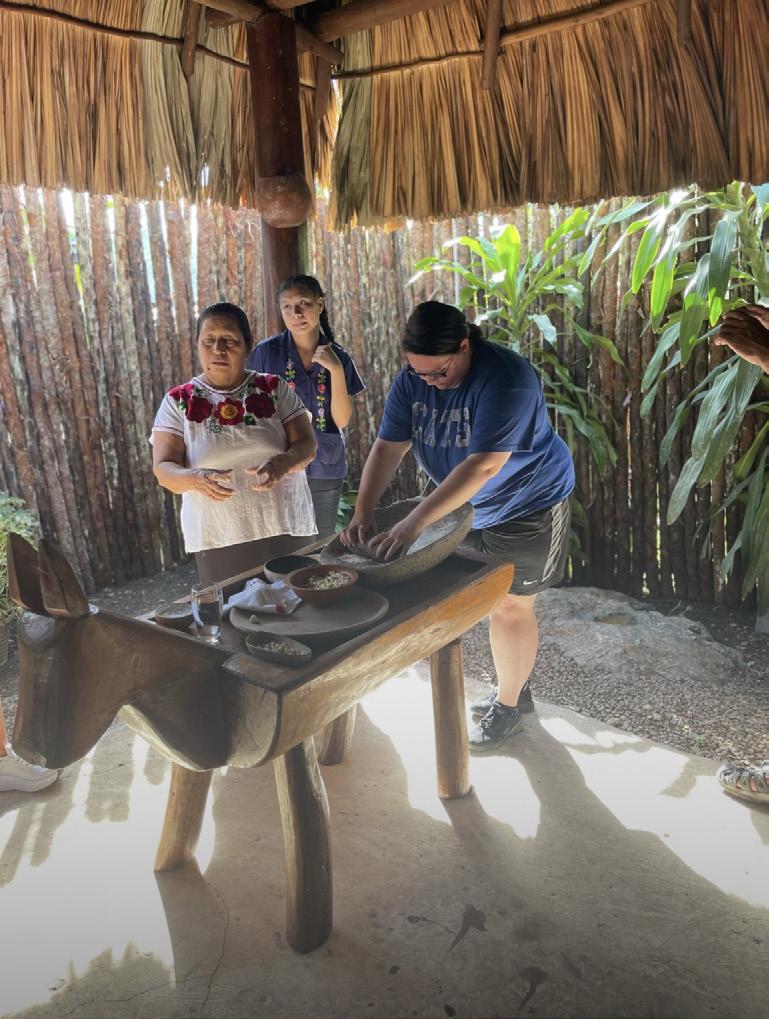
15 HEALTH SCIENCES GATEWAY 2023 ISSUE 2 14 OUTREACH
Photos courtesy of Aimee
“This trip served as a confirmation that I am right where I am supposed to be, and I couldn’t be more excited for my future as a licensed speechlanguage pathologist.”
CSD IN Belize
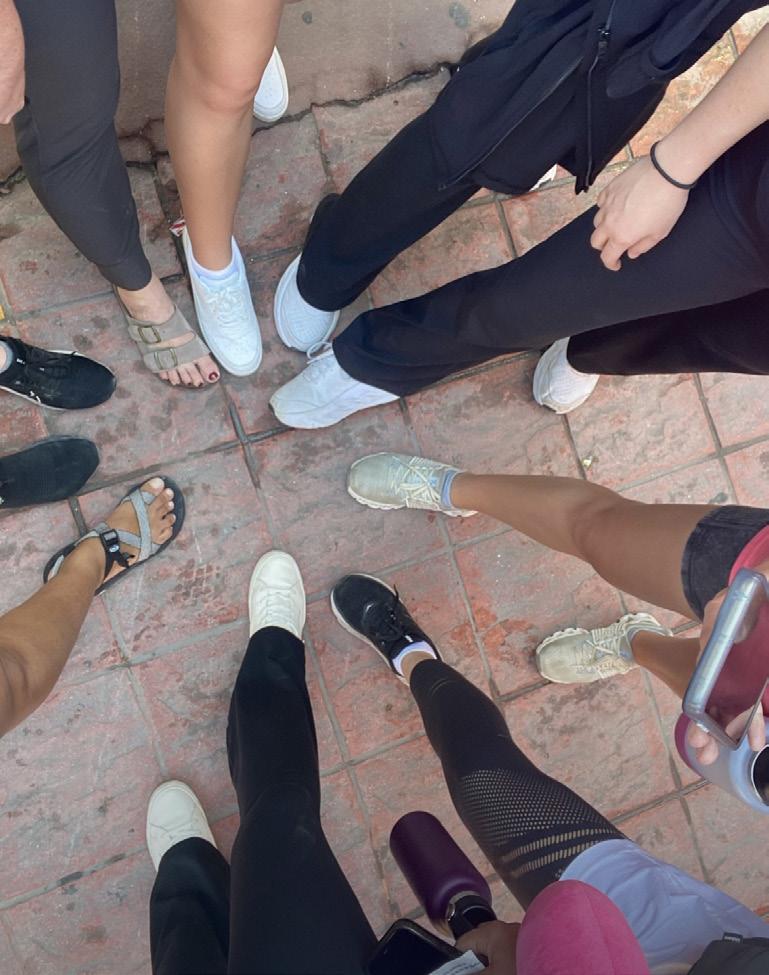
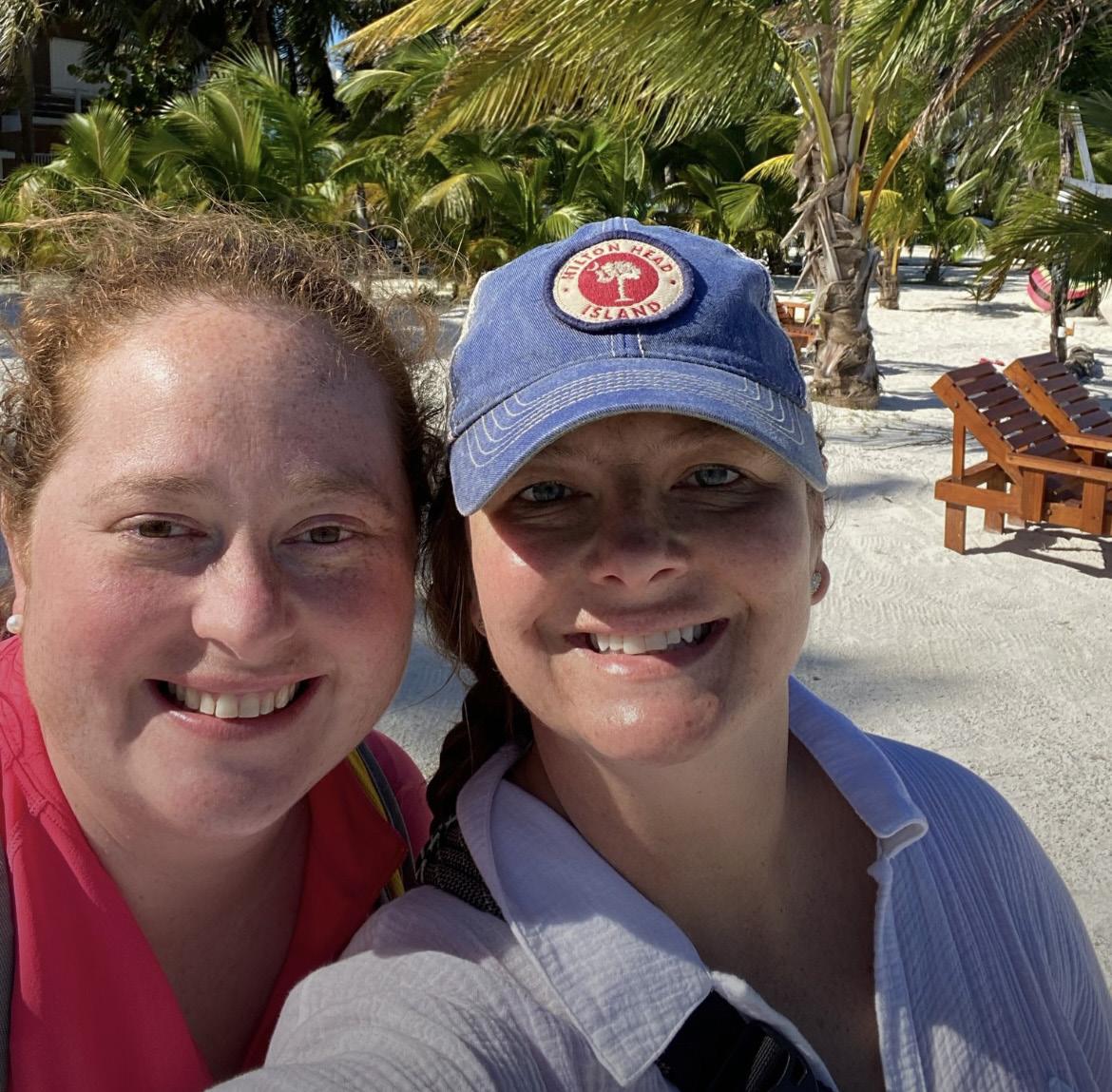
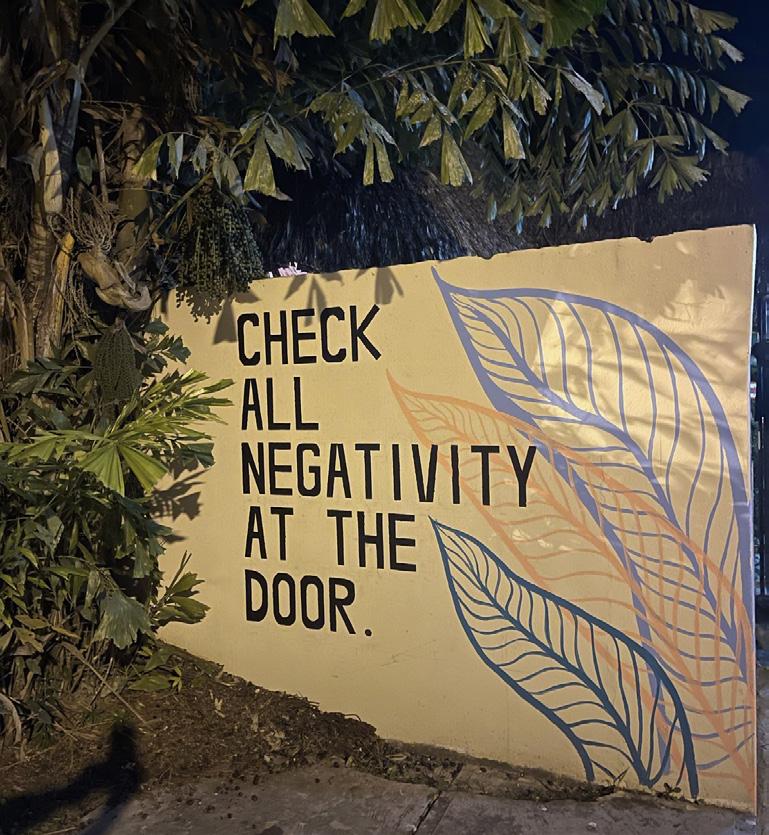
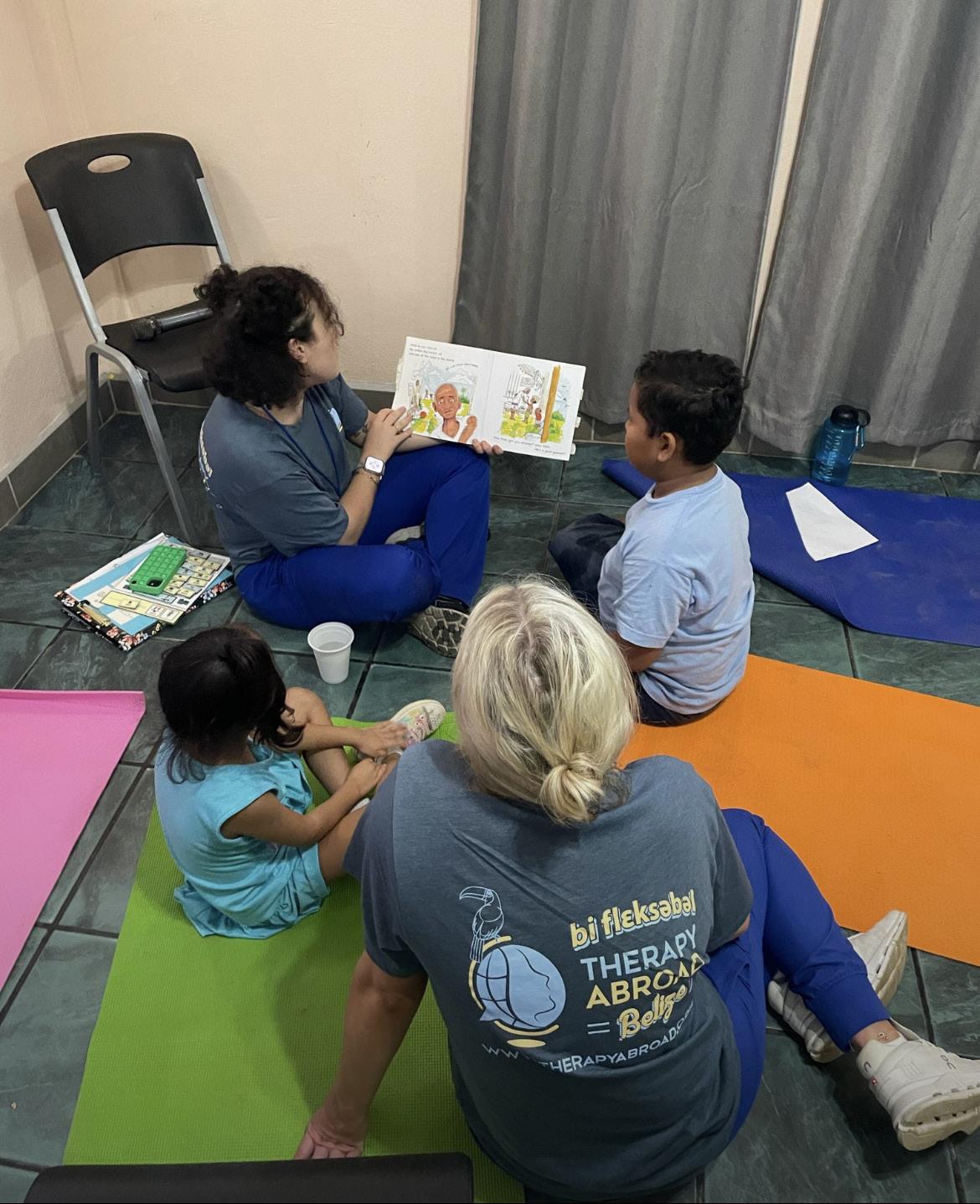
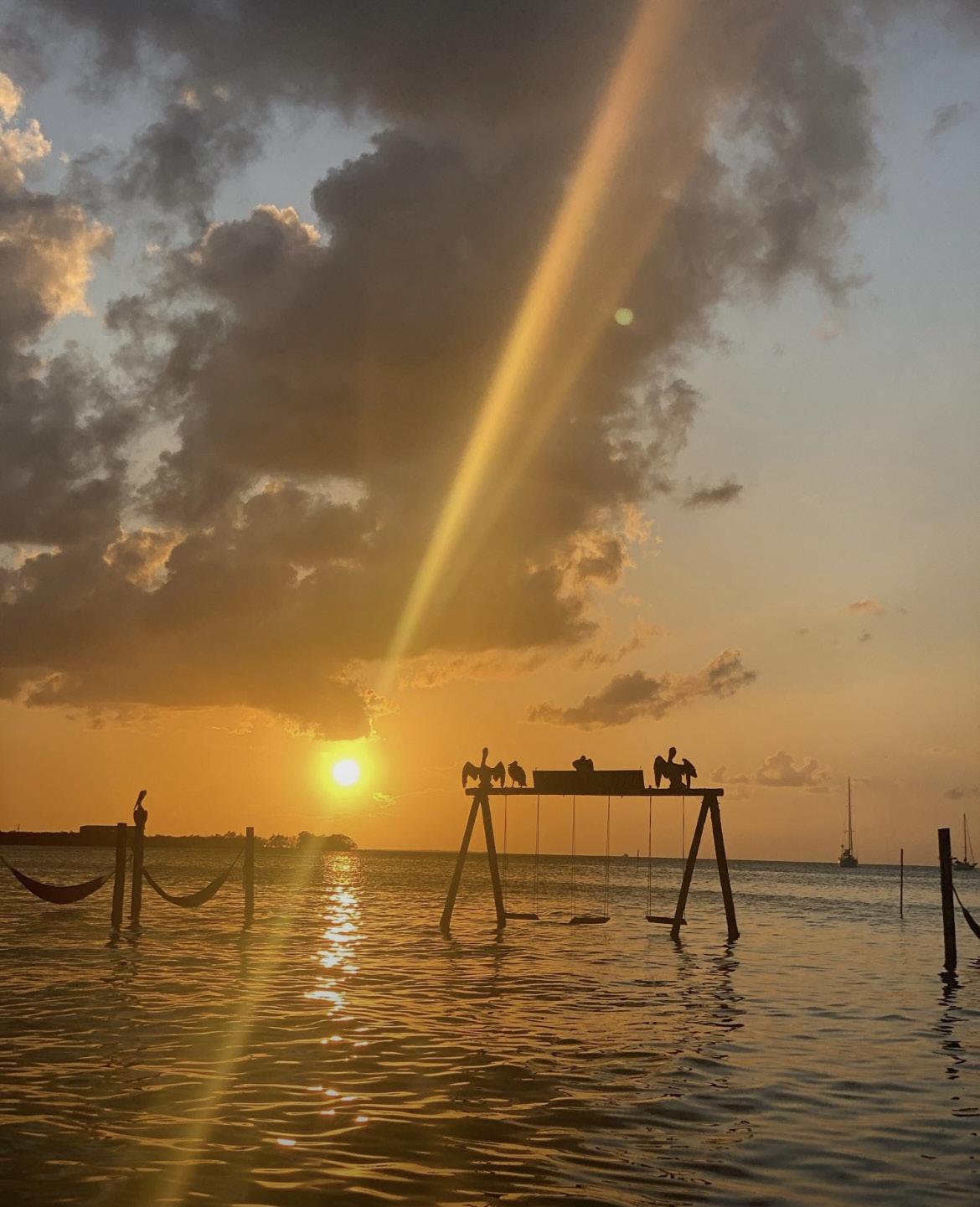
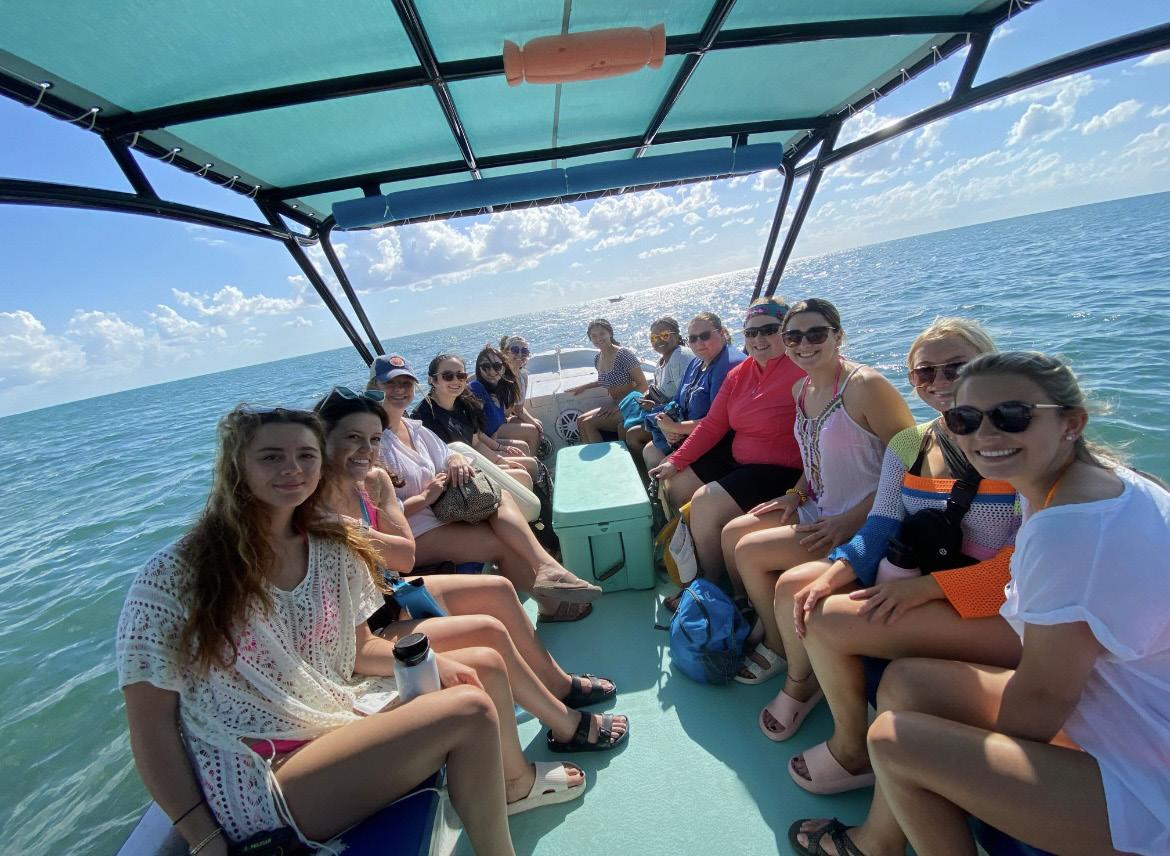
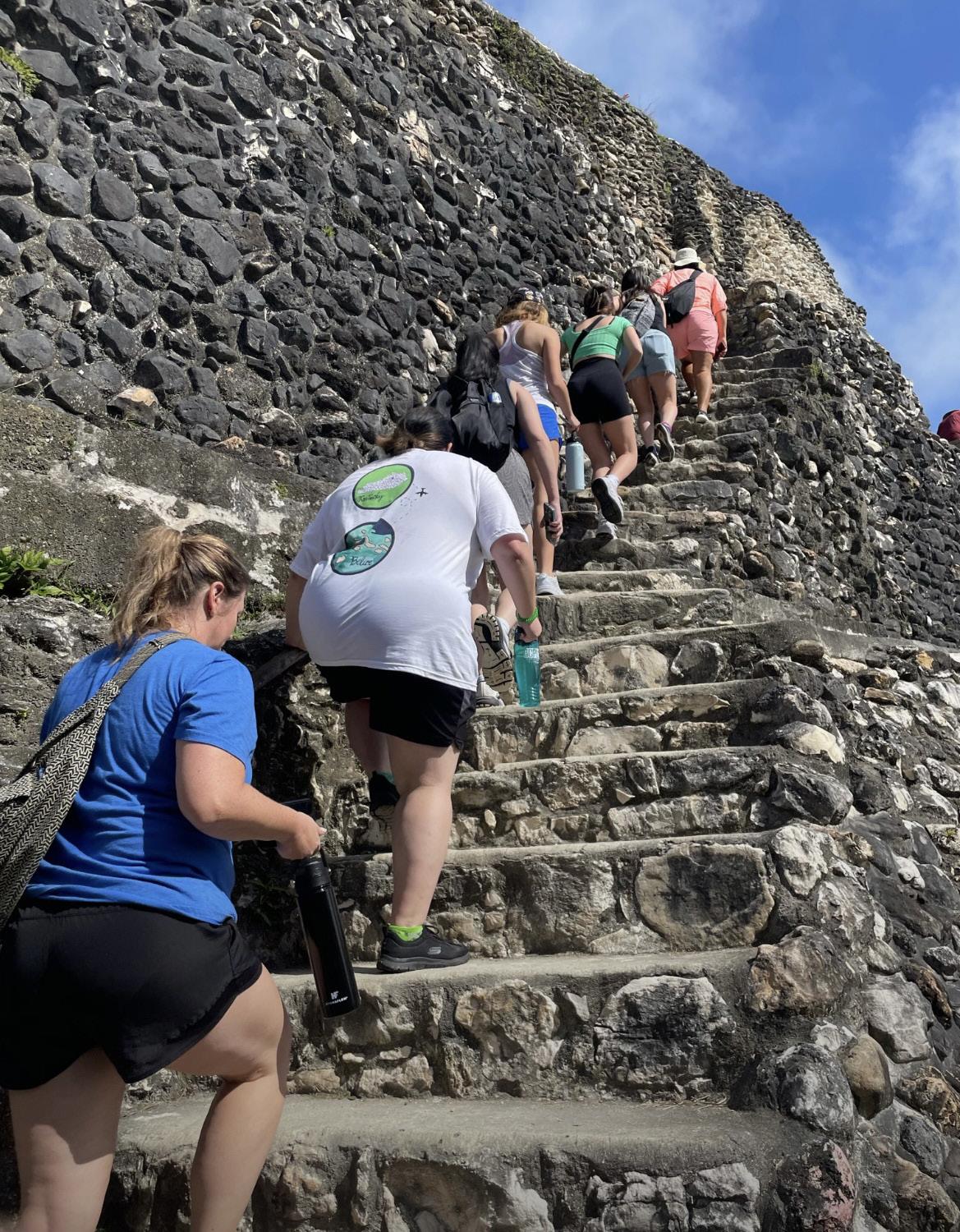
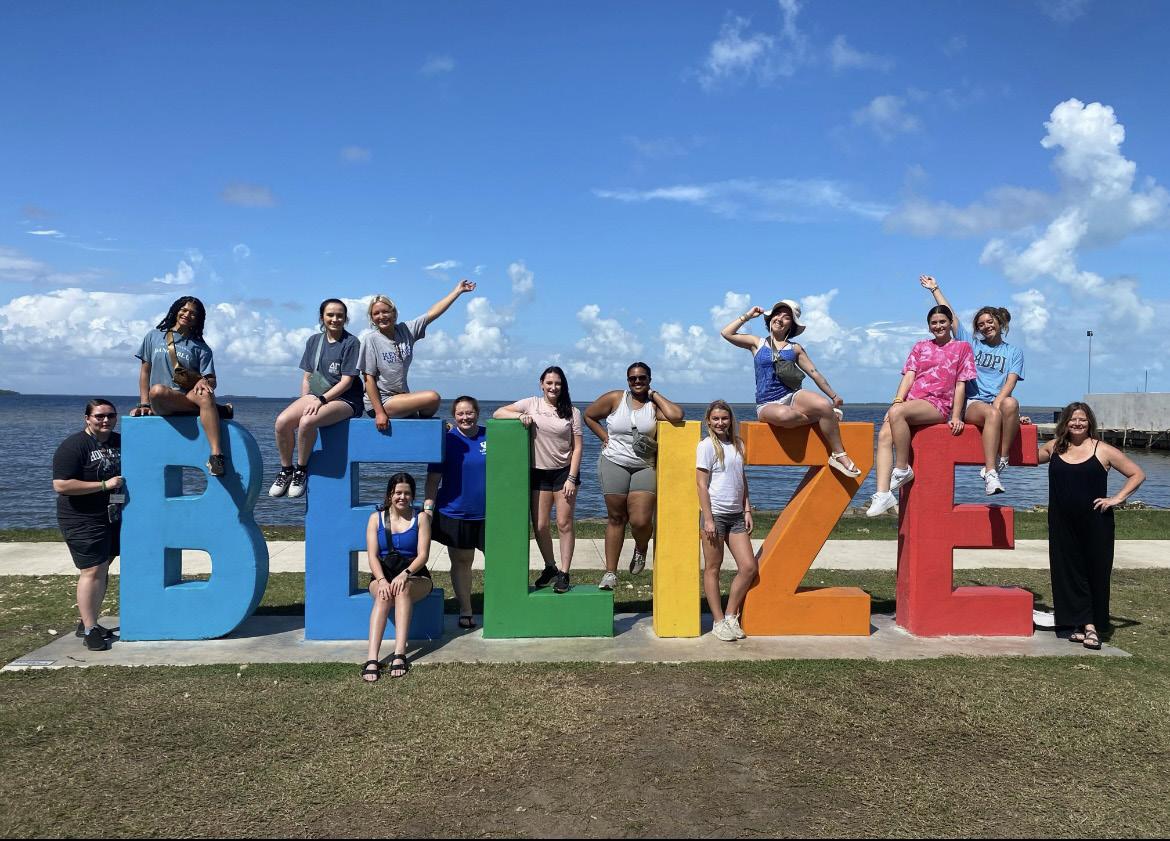

17 HEALTH SCIENCES GATEWAY 2023 ISSUE 2 16 OUTREACH
“You learn to just do the best you can with what you have in a limited amount of time. But it’s true you can make an impact.”
- Mary Beth Allen, MS, CCC-SLP, and Telehealth Support Services Director in Communication Sciences and Disorders
MENTORSHIP, EXPERIENCE & Responsibility
By Sara Pisoni CHS Contributor
“It is one of the aspects of my job that I find most engaging — working with motivated, excited students,” he said.
But, he noted, working with students in a research environment is different from a classroom, as it offers the ability to form closer bonds. From freshmen to seniors, there is a role for everyone to contribute vitally to the success of the team.
One important characteristic that sets CHS apart from its competitors is Undergraduate Research — and Dr. Richard Andreatta has a passion for it. For professors in the College of Health Sciences, they have a luxury some others could only hope for.
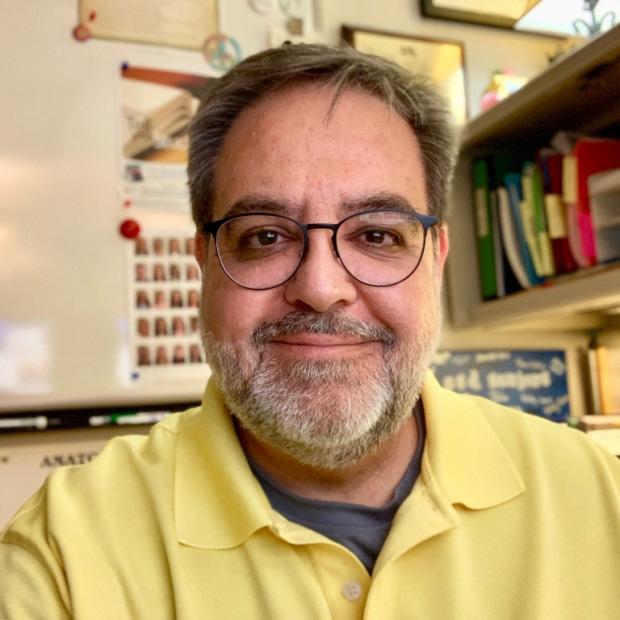
They are utilizing their undergraduate students to help with their research. Mentorship, experience, and responsibility are just a few things that can be gained by the students. Faculty say the students offer support, new ideas and helping hands.
Chris Fry, PhD, associate professor in Clinical Nutrition and associate director of the Center for Muscle Biology, is currently conducting research on skeletal muscle recovery after an ACL injury. He notes that his student-workers are productive, hardworking and constantly exceeding his expectations.
“It provides a great opportunity for hands-on experience as well as building interprofessional skills in another realm of healthcare,” said senior Human Health Sciences (prePhysical Therapy track) major Peyton Balawender, who worked with Richard Andreatta, PhD, ASHA Fellow and professor, Communication Sciences and Disorders and the Rehabilitation and Health Sciences PhD Program. He also serves as the Director of Undergraduate Studies for CSD and the Director of Undergraduate Research for the college.
Tommy Hutchins, a senior Clinical Leadership and Management major involved in undergraduate research, said, “Research has opened my eyes to new experiences and opportunities, united my professional ambitions with my academic curriculum, and introduced me to new friends in the field.”
Hutchins is currently working with Karen Clancy, PhD, MBA, BHS, MT, and assistant professor in Clinical Leadership and Management and Human Health Sciences, as they study burnout of healthcare workers and its impact on quality, safety and patient experience.
A pair of students Clancy worked with last year, Kelsey Gatton and Annamarie Black, published a study on discharge efficiencies and delays — and it influenced clinical development and public policy at the state level. Another pair of students, Garrett Anspach and Anthony Marceletti, finished collecting data on “provider burnout and the implementation of electronic health record systems.” They hope to publish their article by the end of the year.
Clancy continues working with undergraduate students over the years because she sees that students “are inquisitive and motivated to participate in meaningful projects.”
Involvement in undergraduate research as a student can look different for everyone. Whether leading a team, collecting data, processing tissue samples in a lab, or compiling information and writing a report, there is always work to be done.
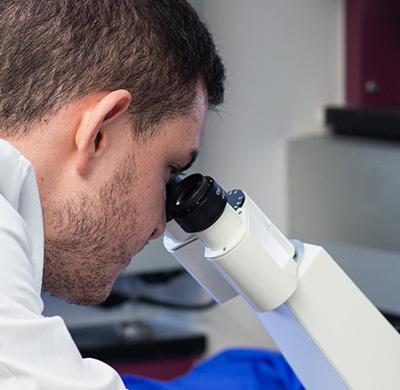
Kirby Mayer, DPT, PhD, and an assistant professor in Physical Therapy, is studying patient-centered outcomes in the ICU recovery clinic. He mentions that student participation takes their research to another level in all steps of the research process. An added benefit, he says, is the opportunity for students to work with and observe those on the clinical side. Interacting with providers such as physicians, pharmacists, or therapists offers the unique chance to see all sides of healthcare.
And the benefits of undergraduate research extend beyond just undergraduate days.
Balawender is looking forward to graduate school and how research opportunities and positions can tie into her future there.
“Without my undergraduate research experience, I would have never even considered a research assistantship,” she said. “It was wonderful.”
WHY I LOVE UNDERGRADUATE RESEARCH
By Richie Andreatta, PhD, ASHA Fellow, Most recent recipient, CHS Excellence in Faculty Scholarship Award, Senior Scholar
have always thought undergraduate research was truly a winwin situation for both faculty and students. Faculty receive help on their research work, helping propel and expand their research agendas, and students learn about the ins and outs of research directly from world-class experts in that field.
think most faculty are strongly interested in sponsoring undergraduate students in research because we all have this need to mentor and foster interest in our own areas of science. I know for a fact, given the number of inquiries and requests that I receive weekly, that undergraduate students are keenly interested and eager to get involved in research with our outstanding faculty.
When I was given the chance to lead the CHS undergraduate research program back in 2019, I quickly realized that had a golden opportunity to help a great many students develop not only an interest in science, but develop a greater awareness of the importance and value of science to their lives.
Getting students active in research during their undergraduate years is not solely about moving them into research-based careers and PhD programs. What is important for them to appreciate is that the process of research is the process of learning: Research is learning and learning is research.
The difference is that when students engage in “mentored research” experiences, they are explicitly made aware of methods and strategies that can help them answer all types of questions now, and into the future.
want the CHS undergrad research program to be something that every undergrad student participates in at some point. The automatic expectation of participating in undergraduate research is what I want others to see as a defining aspect of our College’s culture of learning and undergraduate education.
Helping me accomplish this goal are a group of extraordinary and passionate faculty who go out of their way to make research come to life for our students. I know that I’m biased, but I believe that CHS truly has the most dynamic and multi-talented faculty on this campus. The opportunity for undergraduate students to work closely with our faculty on a common goal is truly exceptional.
19 HEALTH SCIENCES GATEWAY 2023 ISSUE 2 18 DISCOVERY
FOR VOCAL HEALTH
CHS collaborates with the School of Music for screenings as they participate in the Celebration of World Voice Day
BY RYAN CLARK
Communications Director
Katie Ivie felt it was better to be safe than sorry.
After spending a week traveling the country and trying out for graduate schools, the senior musical theater major from Henderson, Ky., said she felt she’d used her voice to its max.
“Our instrument is our voice,” said the 21-year-old. “When I saw this service was available, I had to come in and make sure I hadn’t strained anything.”
Ivie, along with dozens of other students, took advantage of a free UK Voice and Swallow Screening Clinic over the course of the semester in the College of Health Sciences. Held in collaboration with the School of Music, Ivie was able to watch as students examined her vocal chords with a small camera, making sure to note any anomalies they saw.
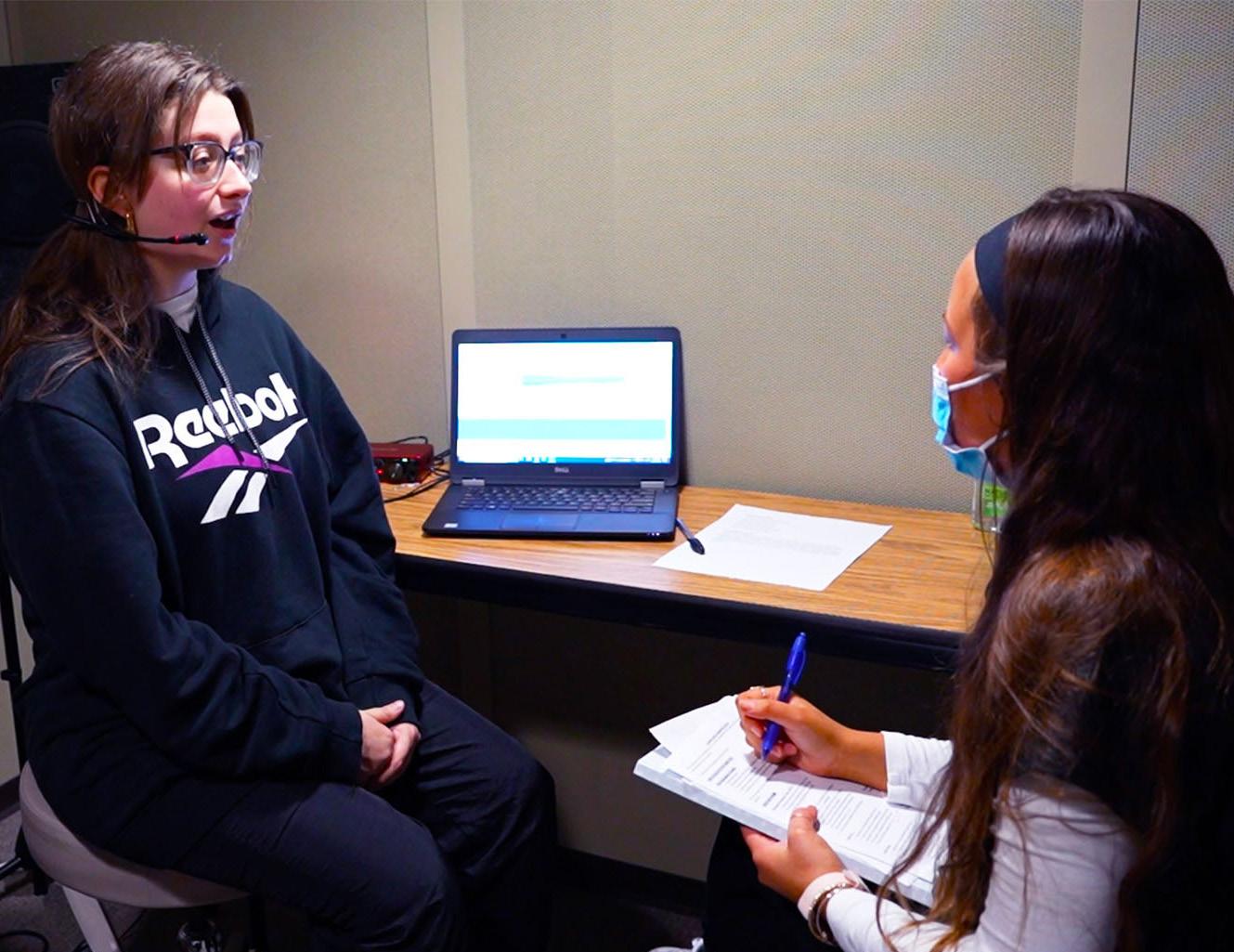
“The clinic is an excellent opportunity for students in both fields,” said Keiko Ishikawa, Ph.D., M.M., CCC-SLP, and assistant professor in Communication Sciences and Disorders. “For students in speech-language pathology, it provides a valuable training opportunity for evaluating voice disorders among professional voice users. For students in vocal performance, students will receive a free screening
of their vocal health, which can help prevent potential problems from developing.”
Ivie watched as the small camera was lowered down her throat. She was told to make a sound, so it could show her vocal chords moving on the screen.
“You can think of this clinic as a screening for athlete’s injury but for vocal health,” Ishikawa said. “Just as student-athletes in basketball undergo regular physical evaluations to assess and prevent potential injuries, this clinic offers singers and other professional voice users a chance to have their vocal health evaluated by trained professionals.”
Ivie made a series of high and low-pitched notes for her clinician. Each made a surprising image on the monitor screen in the room.
Thankfully, nothing was found on her vocal chords; she was 100 percent healthy.
“It’s reassuring to know that my studies here have not only taught me how to be a better singer, but how to be a healthy singer as well,” she said. “The whole scoping procedure
took about five minutes and wasn’t painful at all. I’m very happy that I was able to have this opportunity — all of my colleagues who also had free voice screenings also had nothing but great things to say about their experience as well.”
“The University of Kentucky Voice and Swallow Clinic’s involvement in the screening program underscores their unwavering commitment to providing exceptional clinical education and serving high-risk underserved populations,” said Vrushali Angadi, PhD, CCC-SLP and clinical associate professor in Communication Sciences and Disorders.
“The clinic recognizes that there is a general scarcity of specialized voice and swallow clinical placements, which limits the diversity of clinical experiences available to graduate students in SLP. Furthermore, students are often unaware of the nuances of the problems faced by singers and professional voice users beyond the information provided in their didactic coursework. In an effort to provide a unique clinical experience to our graduate students and serve an underserved population, the faculty in the CSD department and members of the UK Voice and Swallow Clinic collaborated to plan this significant undertaking.”
FACULTY INVOLVED INCLUDED:
• Keiko Ishikawa, Ph.D., M.M., CCC-SLP (CSD)
• Vrushali Angadi PhD, CCC-SLP (CSD)
• Professor Aimee Sayre, MA, CCC-SLP (CSD)
• Ms. Haley DeWitt, MM, MS, CCC-SLP (CSD/UK Health/Voice and Swallow Clinic)
• Ms. Haley Gilroy, MS, CCC-SLP (CSD/UK Health/Voice and Swallow Clinic)
• Angelique Everett, DMA, MM (School of Music)
“The UK Voice and Swallow Clinic’s dedication to the wellbeing of singers at UK and in the Commonwealth will undoubtedly persist long after the completion of the screening program,” Angadi said. “The clinic is fortunate to have two highly experienced singing voice specialists, Haley DeWitt and Haley Gilroy, who not only provide the singers with state-of-the-art care, but also impart their expertise through their teaching collaboration with UK School of Music.”
The faculty were also busy preparing for another event to help celebrate World Voice Day on April 16. This day is celebrated worldwide to raise awareness of the importance of the human voice and its role in effective communication.
The University of Illinois UrbanaChampaign, Michigan State University, and the University of Kentucky invited vocal artists, clinicians and scientists to a World Voice Day event entitled, “The 2nd Symposium: A Day of Voice at the University of Illinois.”
The free virtual conference aimed to raise awareness of the vital role the human voice plays in communication and art.
Ishikawa collaborated with Dr. Pasquale Bottalico and Dr. Lady Catherine Cantor-Cutiva, as well as Professor Yvonne Redman, to organize the symposium. Last year, the event started as an initiative of the University of Illinois, and this year, the University of Kentucky was invited to co-host the event. The symposium’s theme was “The Acoustics of Voice,” and researchers, speech-language pathologists and voice teachers from around the world presented their work.
Among the speakers were CHS’ own Ishikawa and Angadi, who discussed “Vocal health screening at a university setting.”
21 HEALTH SCIENCES GATEWAY 2023 ISSUE 2 20 COLLABORATIVE
“You can think of this clinic as a screening for athlete’s injury but for vocal health,”
CHS
We say goodbye to two retiring professors:
BY RYAN CLARK
Oh, THE PLACES SHE’LL GO!
This semester, the College of Health Sciences said goodbye to two legends — David Fahringer, MSPH, PA-C, and Terry Malone, PT, EdD, ATC, FAPTA — and wished them well as they retired from UK. Together, the pair devoted more than 60 years to the University.
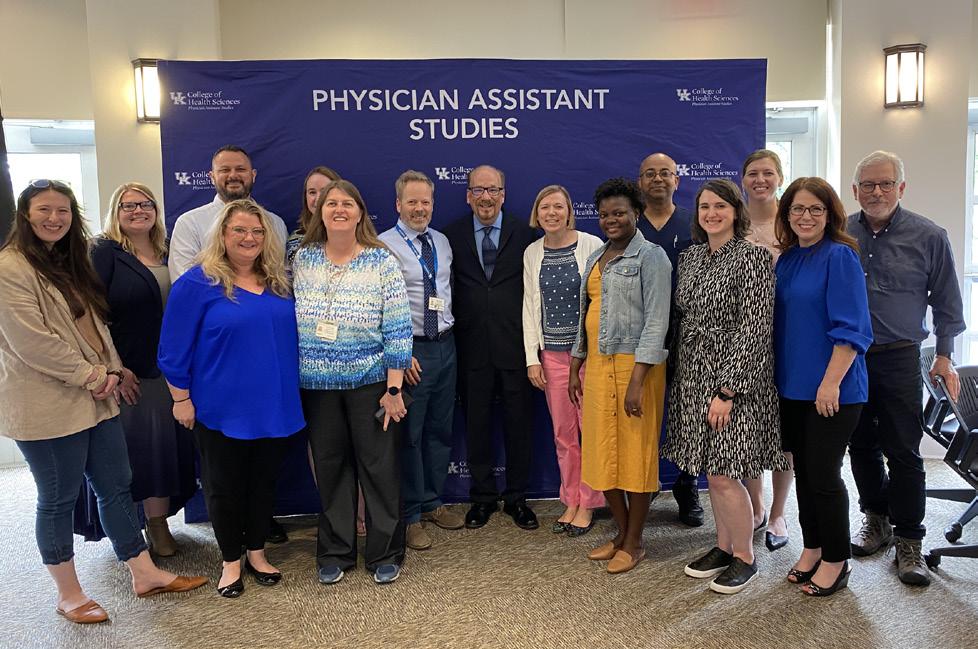
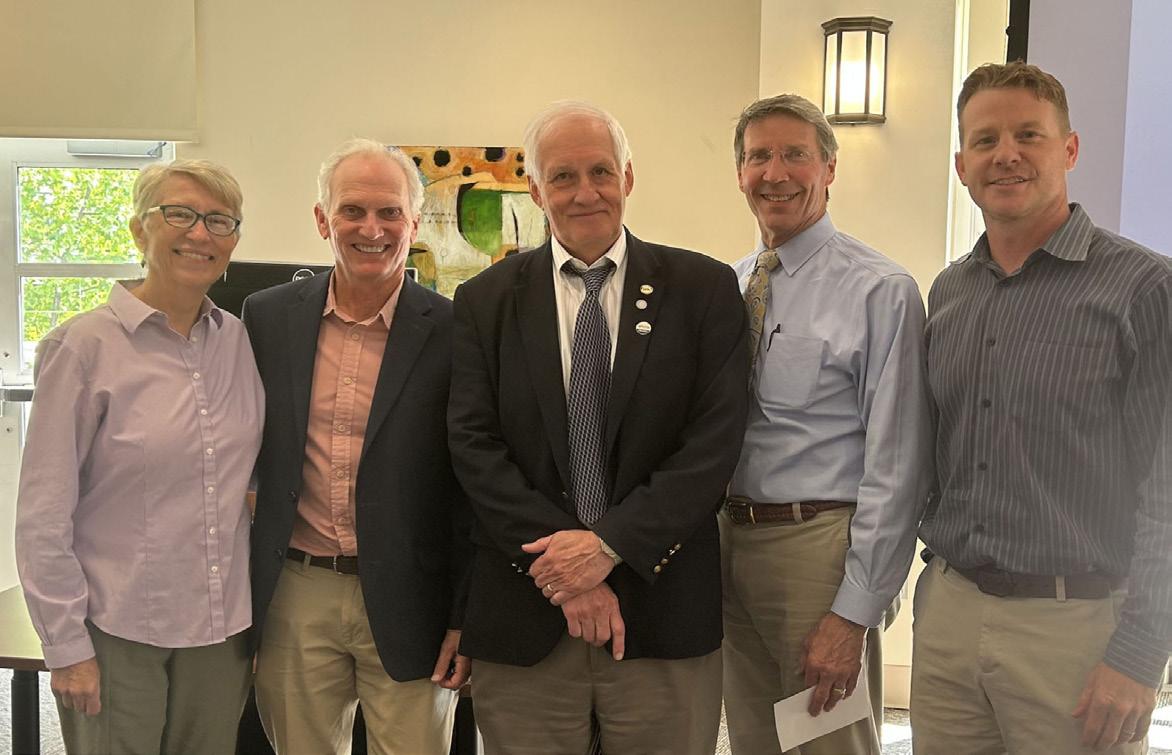
Fahringer began teaching at Kentucky in 1994. From 1995 to 2010, he worked with faculty and leadership at the University of Wolverhampton in England to develop the PA profession and education in the United Kingdom. In 2010 he took a two-year work leave of absence to start the first PA program in the Middle East in Saudi Arabia with George Washington University-Medical Faculty Associates at Prince Sultan Military College of Health Science. He is also one of the four founders of the International Academy for Physician Associate Education.
He returned to the University of Kentucky in August of 2012 and became the Associate Program Director until June 2020. Most recently he has served as the Program Director of Post Graduate Education for PAS and last month, he was named the recipient of the 2023 UK Global Impact Award for Distinguished Faculty Achievements in Internationalizing the Curriculum.
Malone received his EdD and MSPT from Duke University in North Carolina and his BA from Bluffton College in Ohio. He served as the initial Sports PT and was the Coordinator of the Sports Medicine Clinic at Duke, as well as the initial Chairman of the Sports Specialization Council of the APTA.
Malone has been liaison to the American Orthopaedic Society for Sports Medicine and is a member of that organization, while also serving as the initial chair and dean of the Krannert School of PT at the University of Indianapolis. He was the Physical Therapy Program Director at UK from 1993-2006.
“Both men were able to bring national and international visibility to their departments, and on behalf of the faculty, staff and students of the College of Health Sciences, we extend our sincere thanks and appreciation to them for their years of service to the College of Health Sciences and the University of Kentucky,” said Scott Lephart, PhD and Dean of the College. “Personally, I will dearly miss working with both, as they were consummate professionals who shared an infinite amount of knowledge and leadership.”
“I really think we live by loving — you’ve got to figure out what you love,” Malone said at his retirement ceremony. “As Physical Therapists, we make people’s lives better. I’ve been incredibly fortunate to be part of this profession.”
“It’s been a journey ... I thank you all,” Fahringer told the crowd who gathered at his retirement ceremony.
“We have a great future here,” he said. “The potential is fabulous. It will take hard work, and passion, but we can do this ... I just wish I had 25 more years to work.”
BY LORALYN CECIL CHS Director of Philanthropy
Ashyah Morman is an adventurer at heart and a scientist in mind. Her first step toward both was coming to the UK College of Health Sciences.
She was in her senior year in high school in Gaffney, South Carolina, when she decided to come to UK.
“I just really wanted to venture out,” she said. She liked the idea of a large university with so many majors to choose from. She liked the diversity that she saw on campus. “I love different people. I love meeting new people.”
She also liked the idea of being at a university that is part of a community where she could see new things and try new foods.
Her success in high school science classes brought her to the College of Health Sciences. Her academic advisor in the UK College of Health Sciences, Heather Hardesty, suggested she
look at the medical laboratory sciences program.
“I suggested the MLS program to Ashyah because she has a lot of drive and motivation,” Hardesty said. “The MLS degree is a great pathway to an immediate job. You get a return on your investment in your education as soon as you graduate. Later, the degree can serve as a great foundation for future goals and plans.”
Hardesty described the MLS program as having a great support system that Ashyah could thrive in. “The cohorts are small, creating close-knit classes,” she said. “And the faculty are very supportive. I knew she would do well.”
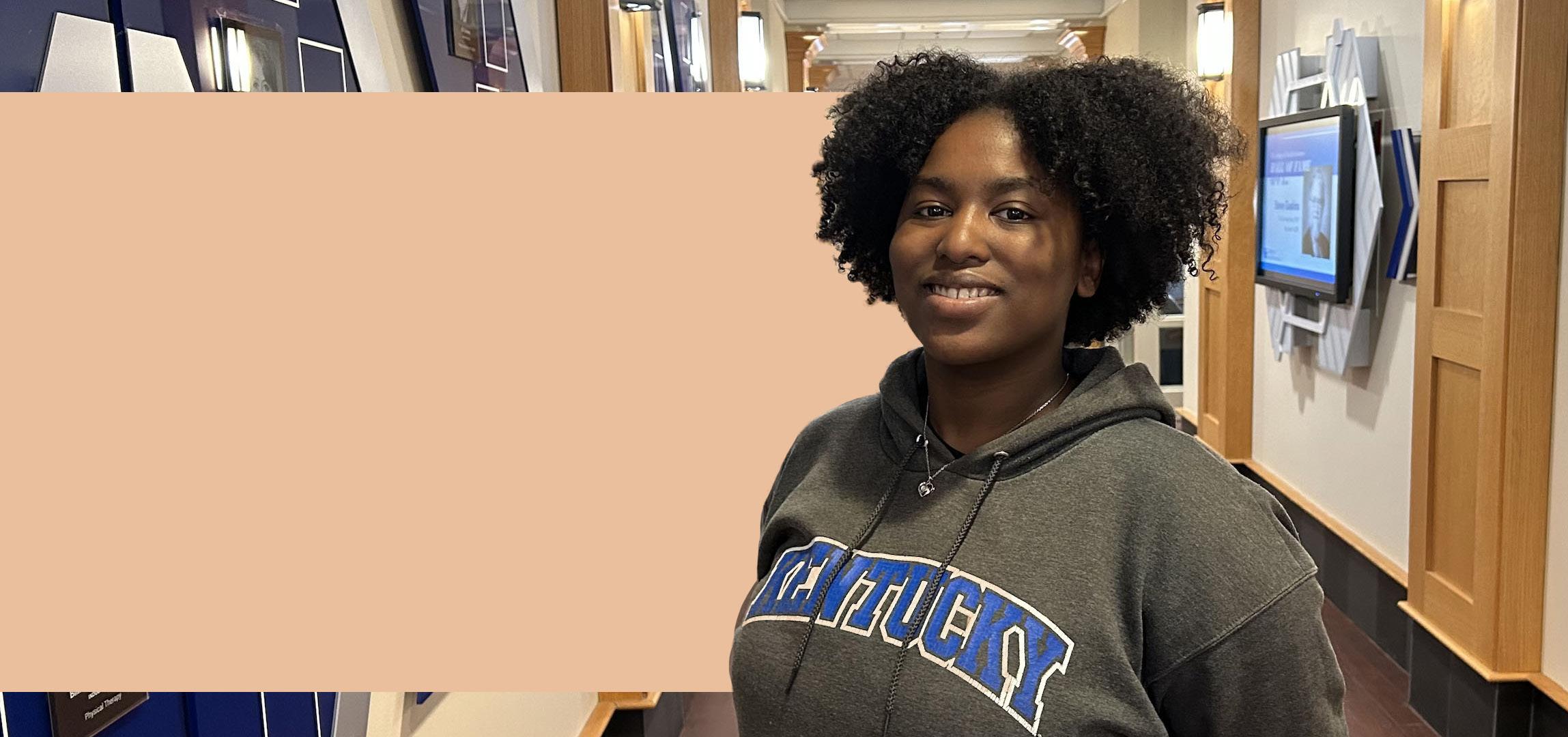
Heather was right. Ashyah has thrived in the program.
“My teachers and parents prepared me for this,” Ashyah said. “They taught me to focus. And they taught me that if you focus your will and strength, you will be able to succeed.”
This year, Ashyah received the Deborah O’Bryan Crowe Clinical Health Sciences Scholarship. When she learned she received the scholarship, she told her parents right away. “They know scholarships are competitive,” she said. And she knows her successes make them proud.
Ashyah is grateful for the generosity of the Crowe family. “Giving is based in your heart,” she said. “Words cannot express how thankful I am to have received the Crowe Scholarship. I will forever be grateful because their generosity helped me pay for the classes needed to get my degree.”
The next steps in her life adventure are to work as a certified medical technician in a hospital laboratory after she graduates. She’s already planning what comes after that.
“In five years, I might go back to school to become a physician assistant, or possibly go to medical or nursing school,” she said.
We won’t bet against her.
23 HEALTH SCIENCES GATEWAY 2023 ISSUE 2
IMPACTFUL
CHS Communications Director
DAVID FAHRINGER & DR. TERRY MALONE
DAVID FAHRINGER, MSPH, PA-C
DISTINCTION
TERRY MALONE, PT, EDD, ATC, FAPTA
OFFICE OF
Research
Grant Awards Received
AWARDS RECEIVED 01/01/2023 TO 06/30/2023
Debra Suiter, PhD, CCC-SLP, BCS-S, F-ASHA
Dysphagia: In Search of a Unified Definition for the Aging Population
NIA/NIH
$49,015
Virginia Valentin, DRPH, PA-C Promoting Resilience and Mental Health Among Health Professional Workforce
University of Utah
$5,535
Cheryl Vanderford, MPAS, PA-C
2023 Communities Talk to Prevent Alcohol and Other Drug Misuse
Substance Abuse & Mental Health Services Administration
Ming-Yuan Chih, PhD, ACHIP, FAMIA
Integrating mHealth for Alcohol Use Disorders into Clinical Practice
University of Wisconsin (NIH)
$10,000
Deirdre Dlugonski, PhD
Connected for Movement: University, Community, and School Partnerships to Disrupt
Inequity in Physical Activity
Women’s Sports Foundation
$9,576
Deirdre Dlugonski, PhD
Connected for Movement Outreach Program
KY Department for Public Health
$160,163
Christopher Fry, PhD
Rejuvenation of Skeletal Muscle Regeneration in Patients with Kidney Disease
Albert Einstein College of Medicine
$30,000
Christopher Fry, PhD
Myostatin Alters Muscle Composition as a Result of an ACL Injury
NIAMS/NIH
$434,765
Christopher Fry, PhD
Preclinical Developments of a Novel Therapeutic to Rejuvenate Aging Muscle
Stem Cells and Enhance Muscle Strength and Function in Post Hip Fracture
Ridgeline Therapeutics
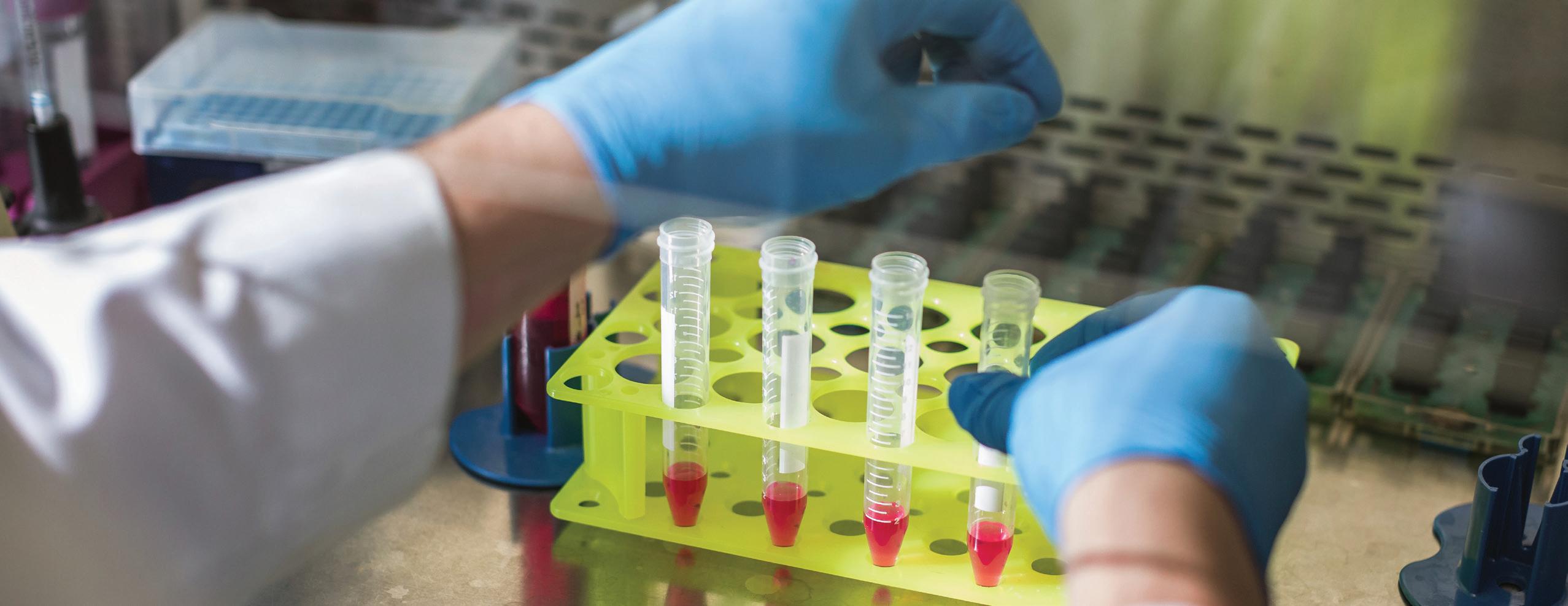
$177,165
Emily Gabriel, PhD, ATC
Predictors of Participation in a Home-Based Injury Prevention Program in Those with a History of Ankle Sprain
Southeast Athletic Trainers Association
$808
Phillip Gribble, PhD, ATC, FNATA Safety, Health, and Injury Mitigation in Firefighter Training (SHIFT)
Federal Emergency Management Agency
$376,116
Charlotte Peterson, PhD, and John McCarthy, PhD
The Role of Satellite Cells in Skeletal Muscle Hypertrophy with Aging
NIA/NIH
$360,880
$750
INTERNAL
Deirdre Dlugonski, PhD
Families Moving Together: Designing and Feasibility
Testing a Community Physical Activity Intervention for Public Housing Residents
United in True Racial Equity (UNITE)
$49,396
Christopher Fry, PhD
Validation of non-invasive muscle imaging biomarkers for symptomatic posttraumatic knee osteoarthritis
UK OAK Alliance
$15,000
STUDENT AWARDS
Meredith Owen, PhD
NRSA F32: Establishing the Relationship Between Muscle Quality and Joint Loading for Individuals with Transtibial Amputation
NICHD/NIH
$69,080
CHS RESEARCH & SCHOLARSHIP
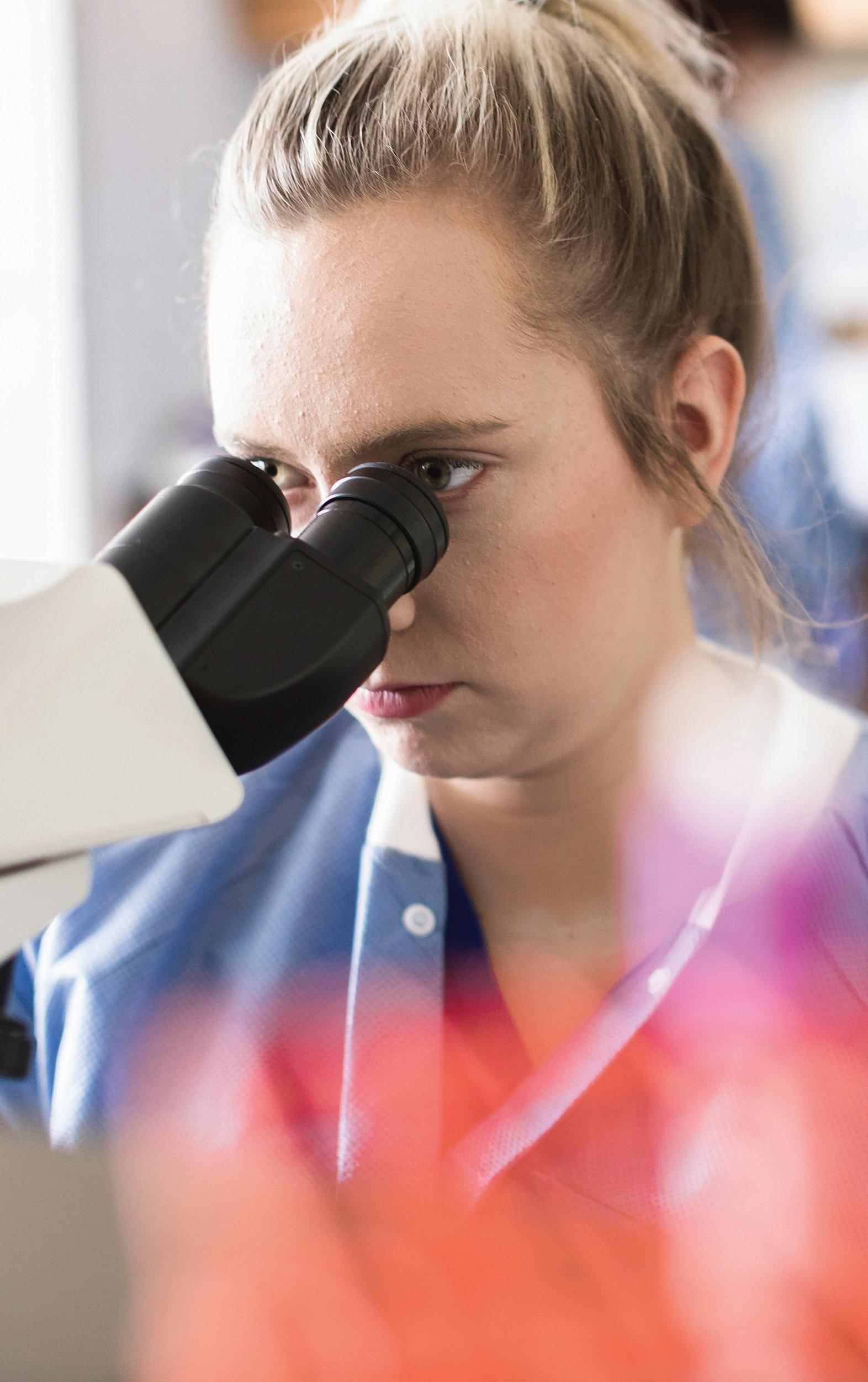
SUPPORT PROGRAM PILOT
Christopher Fry, PhD
Validation of Non-Invasive Muscle Imaging Biomarkers for Knee Osteoarthritis
$10,000
Christy Brady, PhD
Developing Life-Long Learners: Utilizing Book Clubs as Structured Assignments in Undergraduate Courses
$250
25 HEALTH SCIENCES GATEWAY 2023 ISSUE 2 24
RESEARCH GRANTS
Thank you
TO OUR DONORS
GIFTS MADE BETWEEN 01/01/23 AND 06/09/23
McDougall Student Endowed Scholarship Fund
Mrs. Donna J. Borden
Mrs. Lynne Coy-Kaminski
Mr. Keith J. Hudson
Barbara Sanders, PT, PhD
Dwain Robert Rice Memorial Scholarship Fund
Dr. Esther Dupont-Versteegden
Mr. Keith J. Hudson
College of Health Sciences
Graduate Student Relief
Endowed Fund
Dr. Janice M. Kuperstein
Howell UK Sports Medicine Research Institute Fund
Mr. S. Oden Howell, Jr.
Patricia “Pat” Motley Waggener Scholarship Fund
Mrs. Sharon T. Nesmith
Mrs. Patricia M. Waggener Amy Waugh Memorial Scholarship
Ms. Kristen L. Goble
Dr. Matt Hoch
Ms. Charlotte F. Waugh
Health Sciences Academic Fund for Excellence
Dr. Richard D. Andreatta
Ms. Caroline N. Arthur
Ms. Jennifer Catalfino
Dr. Ming-Yuan Chih
Mr. Andrew G. Clarke
Mr. Adam Len Davis
Mrs. Dawn Kathleen DeBrocco
Mr. Scott Anthony DeCiantis
Ms. Tammy Jo Edge
Mrs. Emily Hartley Gabriel
Ms. Nancy O. Cunningham Garrett
Dr. David G. Greathouse
Mrs. Myra L. Handshoe
Hazle Family Donor Advised Fund
Mr. John G. Jurjans
Mrs. Virginia W. Longnecker
Barret Lanham May
Mrs. Denise N. McCarthy
Ms. Sheila A. McKinney
Ms. Maureen W. Meehan
Ms. Karen A. Miles
Mrs. Dennissa Fairchild Miller
Dr. Brendan J. O’Farrell
Dr. Anne Desmarais Olson
Mrs. Alexis Phillips
Mrs. Wendy J. Pulliam
Dr. Randa Remer-Eskridge
Mrs. Suzanne C. Scarpulla
Dr. Casey Shadix
Dr. Sharon R. Stewart
The Medtronic Foundation
Dr. Scott David Tomchek
Mr. Jonathan R. Vinson
Ms. Mary S. Vosevich
Mrs. Celia M. Wilke
Mrs. Katherine Wolnitzek
Dr. Leslie Woltenberg
Physician Assistant Studies
Development Alumni Fund
Dr. Somu Chatterjee
Mr. Gary D. Crump Gilead Sciences, Inc.
Mrs. Carol T. Neiheisel
Dr. Kevin M. Schuer
Communication Disorders Development Alumni Fund
Dr. Gilson J. Capilouto
Mr. Michael Crary
Dr. Jane O. Kleinert
Mr. Timothy Lauzon
Dr. Donna S. Morris
Clinical Laboratory Sciences Development Alumni Fund
Mr. Chad Guilliams
Mrs. Jane B. Roberts
Clinical Nutrition Development
Alumni Fund
Mrs. Carol J. Chappell
Physical Therapy Development
Alumni Fund
Ms. Loralyn A. Cecil
Dr. David G. Greathouse
Mrs. Cynthia L. Hile
Mr. Keith J. Hudson
Mrs. Whitney Lush Quiambao
Barbara Sanders, PT, PhD
CAHP Athletic Training
Development and Alumni Fund
Mr. Benjamin D. Gecewich
Ms. Stacy Khun
William J. Meadors Physician
Assistant Educational Fund
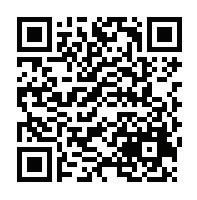
Mrs. Debbie A. Croucher
PAS Commitment to Rural Health
Award
Mrs. Shelley Irving
St. Claire Healthcare
Rosenthal Sports Medicine Research Institute Fellowship Fund
Rosenthal Family Foundation
SMRI Gift Fund
Mr. Paul Kemp
Dean Scott M. Lephart
Ethan Earlywine Student Emergency Fund
Anonymous
Deepa Ramesh Valvi
College of Health Sciences
Samaritan’s Touch Clinic Fund
Mrs. Amy K. Brown
Mr. Ryan A. Clark
Active Women’s Health Initiative Fund
Dr. Lori A. Bolgla
Ms. Cristen Bridegam
Ms. Jill Burkeen
Mr. Kelly M. Cecil
Ms. Kathleen DeBoer
Ms. Brigid L. DeVries
Ms. Leslie E. Dodd
Ms. Sarah L. Dodd
Ms. Bettie L. Evans
Mr. Richard A. Ford
Mr. Richard A. Ford
Mrs. Jane Y. Gettler
Mr. Jonathan C. Hale
Dr. Nicholas R. Heebner
Dr. Johanna M. Hoch
Ms. Kathleen M. Johnston
Mrs. Carolyn Nelson King
Ms. Martha Mullins
Mrs. Charlene G. Robertson
Mr. Don Robinson
Mrs. June Zent
Ellen Felice Mattacola
Scholarship Fund
Dr. Carl G. Mattacola
Medical Laboratory Science Scholarship Fund
Mr. Richard M. Bloyd
Ms. Amy Leeann Hardison
Ms. Julie A. Jacoby
Ms. Mimi Loan
Ms. Joanna I. Lyon
Mrs. Patricia M. Waggener
Ms. Rhonda Wicker
Physical Therapy Program
Scholarship Fund
Ms. Loralyn A. Cecil
Ms. Brenda B. Gosney
Mrs. Cynthia L. Hile
Mr. Keith J. Hudson
Mrs. Kristie Michelle Law
Dr. Terry R. Malone
Ms. Anne W. McLaughlin
Mrs. Susan A. Nalepa
Mr. Michael Necessary
Ms. Samantha Lynn Platt
Barbara Sanders, PT, PhD
Ms. Amanda Michele Trail
Mrs. Debra S. Turner
Mrs. Tina L. Volz
Kentucky Appalachian Rural Rehabilitation Network Fund
Toyota Motor Manufacturing, Kentucky, Inc.
Communication Sciences
Disorders Scholarship Fund
Dr. Anne Desmarais Olson
SMRI Jockey Equine Initiatives
Gift Fund
The Sheryl North Revocable Trust
Active Duty Military and Veterans Fund
Dr. Eric S. Roemmele
Dr. Scott W. Shaffer, PT, Ph.D.,
OCS, ECS
Dr. Enrique Smith-Forbes
Grace Jones Memorial Fund
Ms. Loralyn A. Cecil
Dr. Elizabeth A. Debski
Dr. Davy Jones
Ms. Karen E. Winiarczyk
Mobley Gift Fund for UK SMRI
Mr. William T. Young, Jr.
Clinical Leadership & Management Development/ Alumni Gift Fund
Ms. Jahsleighe K. Rochell
Ms. Rhonda Wicker
Gorman Medical Laboratory Sciences Scholarship Fund
Dr. Linda S. Gorman
AWHI Administrative Support Fund
Dr. Mary Lloyd Ireland
Fahringer Underwood Scholarship Fund
Dr. Andrew C. Bernard
Ms. Vicki L. Conaway
Dr. Gerry A. Gairola
Rebecca Griffith
Ms. Grace Homstad
Mrs. Talitha Poulson Hunt
Ms. Shelley Renae Irving
Ms. Laura Lucas
Ms. Paige Guidry Morgan
Ms. Priscilla J. Nix
Mr. William W. Sparkman
The Saha Foundation
Mrs. Dorothy Warmouth
Ms. Anna Wilhoit Dysphagia Research Conferences & Travel Fund
BRACCO Research USA, Inc.
Mr. Russell Campbell
Ms. Theresa Richard
INTERESTED IN DONATING?
HEALTH SCIENCES GATEWAY 26 27 2023 ISSUE 2
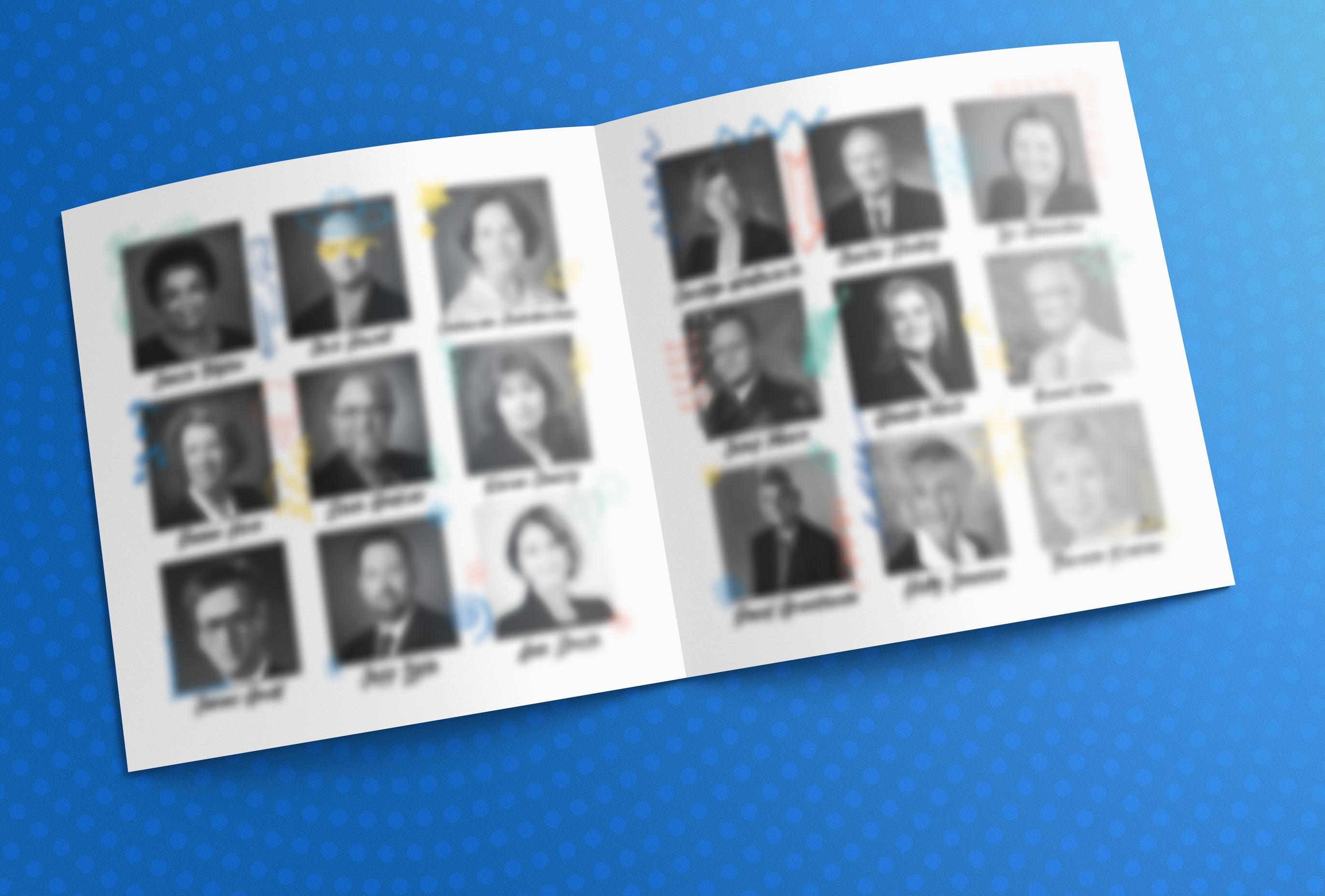
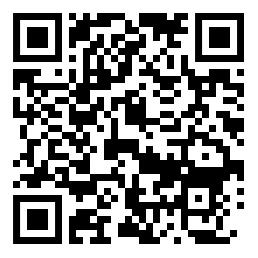
Non-Profit Org. US Postage PAID Lexington, KY Permit #51 uky.edu/chs https://tinyurl.com/alumni-info Contact the CHS Alumni family at scan here to





































